


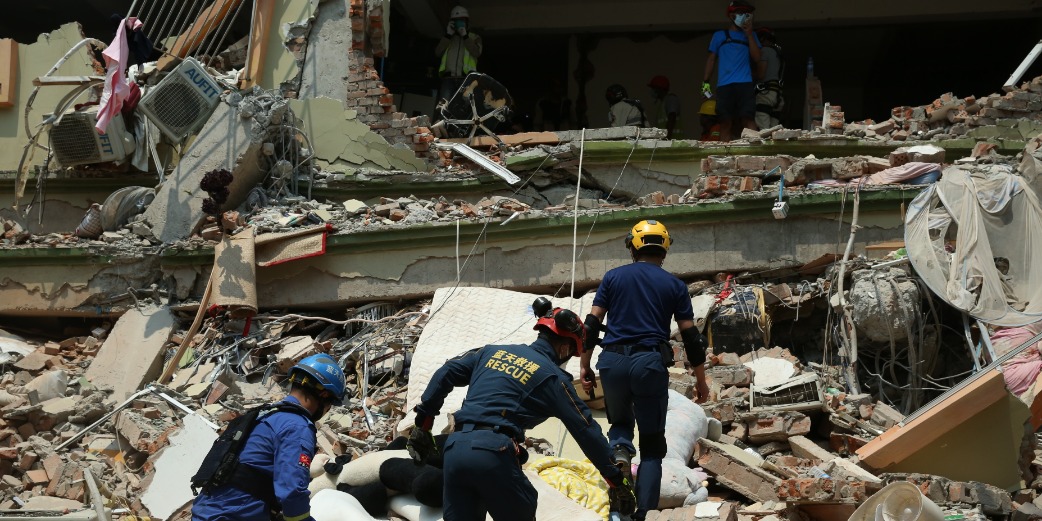
The death toll has risen to 3,145, with 4,589 injured and 221 still missing.
4 Chinese citizens dead, 13 injured in the earthquake.
YANGON -- The death toll from a 7.9-magnitude earthquake in Myanmar has risen to 3,145, with 4,589 people injured and 221 missing, the Myanmar Radio and Television reported on Thursday.
The Myanmar Fire Services Department, in collaboration with international rescue teams, has been carrying out search and rescue operations, the report said.
So far, they have saved 653 people trapped under debris and recovered 626 bodies, it added.
As of Thursday morning, Myanmar has experienced 66 aftershocks ranging from magnitudes 2.8 to 7.5, according to the country's Department of Meteorology and Hydrology.
YANGON -- The Chinese Embassy in Myanmar confirmed that as of 16:00 Beijing time on Thursday, the powerful earthquake in Myanmar has resulted in the deaths of four Chinese citizens and injuries to 13 others.
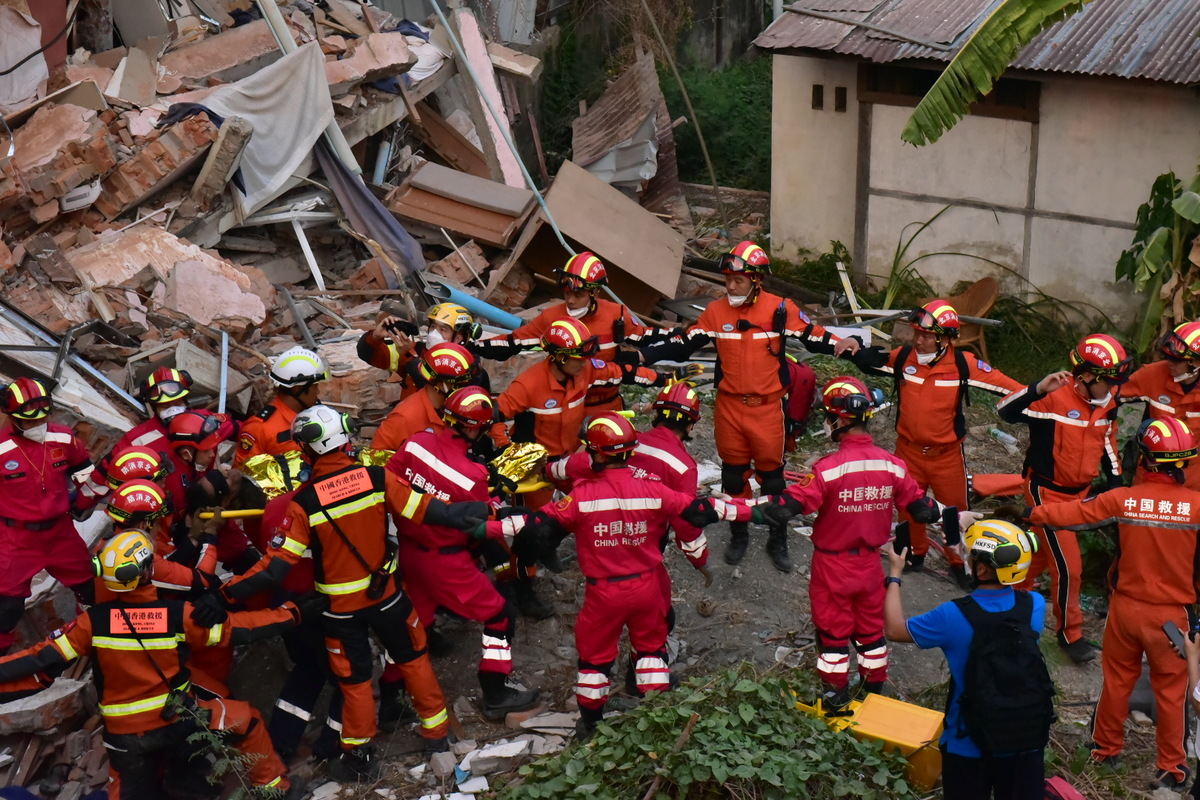
More than 120 hours after a powerful earthquake struck Myanmar, Chinese rescuers on Wednesday night pulled a 52-year-old man alive from the rubble of a collapsed hotel in Mandalay.
The rescue came after the critical 72-hour window had passed and as temperatures in the city soared above 40 degrees Celsius. The survivor was in stable condition and receiving treatment at a local hospital, authorities said.
"We used our equipment to accurately detect signs of life in the collapsed building and continuously received feedback, eventually confirming that the survivor was at the bottom of this collapsed hotel structure," said Yue Xin, team leader of Operation Group, China Search and Rescue Team.
Yue said the eight-story Golden Village Hotel partially collapsed during the 7.9-magnitude earthquake on March 28, with its bottom three floors crumbling while the top five remained relatively intact. After technical assessments deemed the site safe for rescue operations in the absence of aftershocks, teams moved in.
China's disaster relief command center coordinated the response, deploying rescue personnel, technical experts, and medical teams, Yue said.
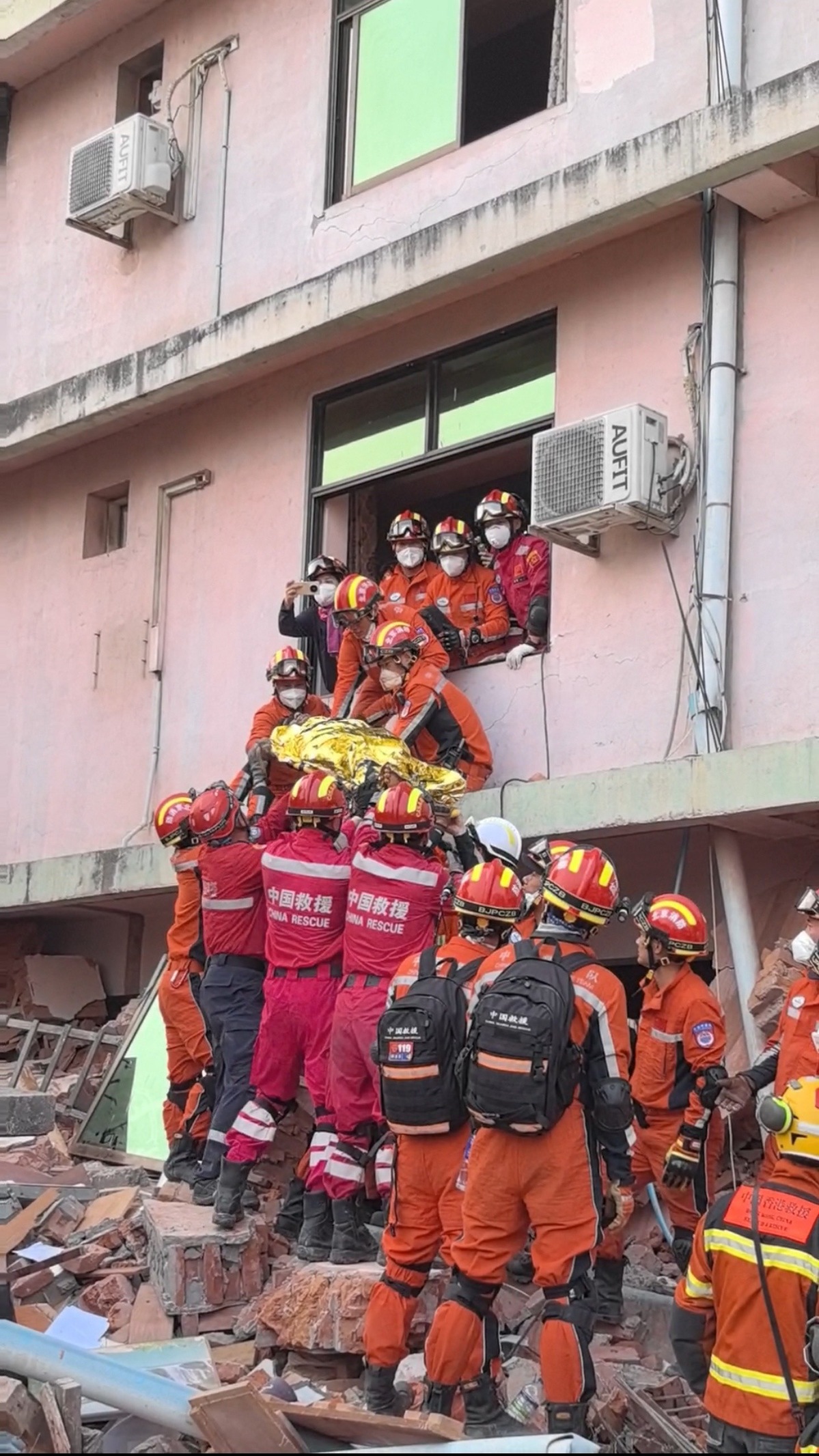
Rescuers decided to enter from the ground level and drill downward, using an endoscope to locate the man.
"This survivor must have had good earthquake survival knowledge," Yue said. "He sheltered between two beds, which provided protection from falling debris and prevented serious injury. The space had some ventilation after the collapse, and he had a pot of water nearby, which were crucial for his survival."
After establishing contact with the man using a translator, the team provided him with saline solution before extracting him.
"After six consecutive days of high temperatures, the chances of finding survivors were very low. However, Chinese rescue personnel persisted in their search efforts," Yue said.
"I am extremely grateful to the Chinese rescue team. I could hear their search efforts, which gave me the faith to survive," the survivor said.
At 5:40 pm on Wednesday, rescuers lifted him onto a stretcher and transported him to a hospital.
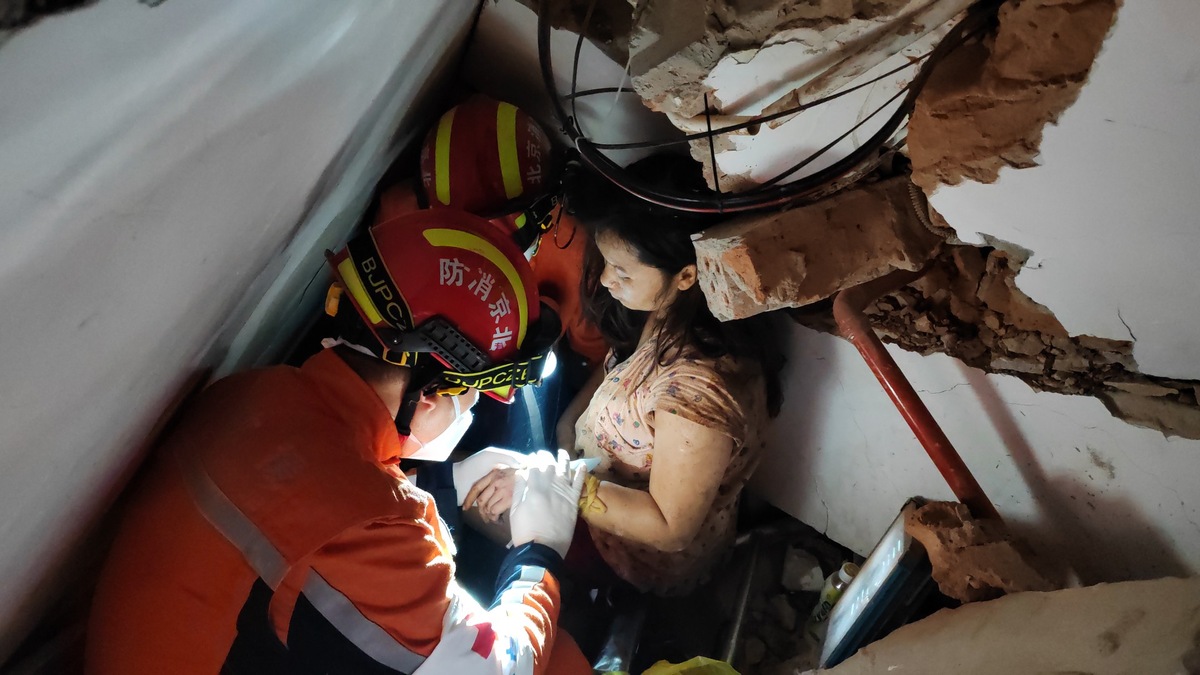
The China International Search and Rescue Team, and a rescue team from Hong Kong, and the Shenzhen Rescue Volunteers Federation also participated in the operation.
Other groups, including Blue Sky Rescue, have also been conducting continuous search-and-rescue operations for more than 100 hours since arriving in Mandalay on March 30.
As of Thursday, Chinese teams had rescued nine people trapped in the quake's aftermath.
"Thank you to our Chinese friends. Whenever help is needed anywhere in the world, you are the first to arrive," said Li Yanlin, a resident currently sleeping on a mat by the riverbank.
"In recent days, we have seen Chinese volunteers in every street and alley, working tirelessly day and night in search-and-rescue efforts, and providing us with tents, food, and water. Just now, they asked me if I needed anything, which made me feel very reassured," she said.
Mandalay's airport was paralyzed after the quake, requiring a 12-hour bus ride from Yangon for arriving relief teams. However, by Monday, large quantities of Chinese rescue supplies, donations, and medical teams had begun arriving, with various organizations coordinating aid distribution and post-disaster epidemic prevention efforts.
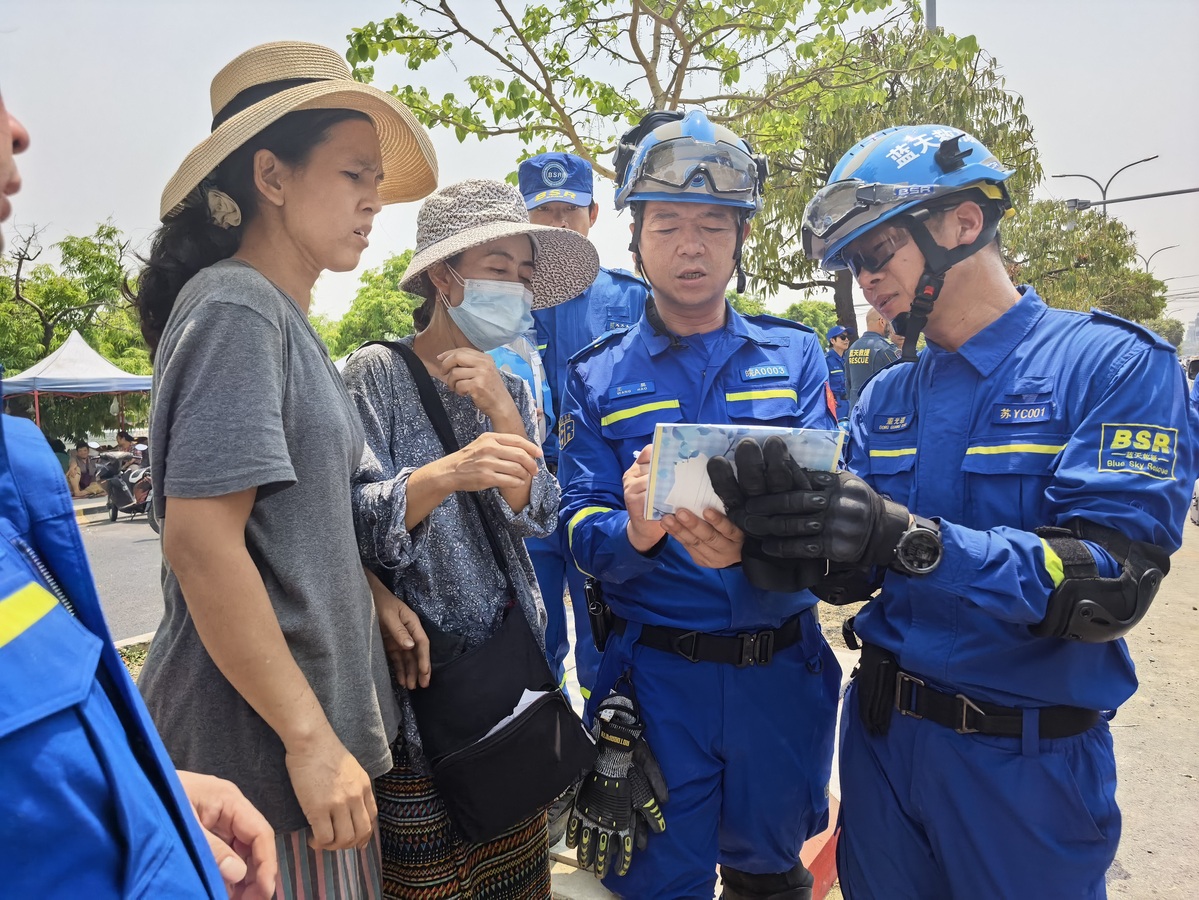
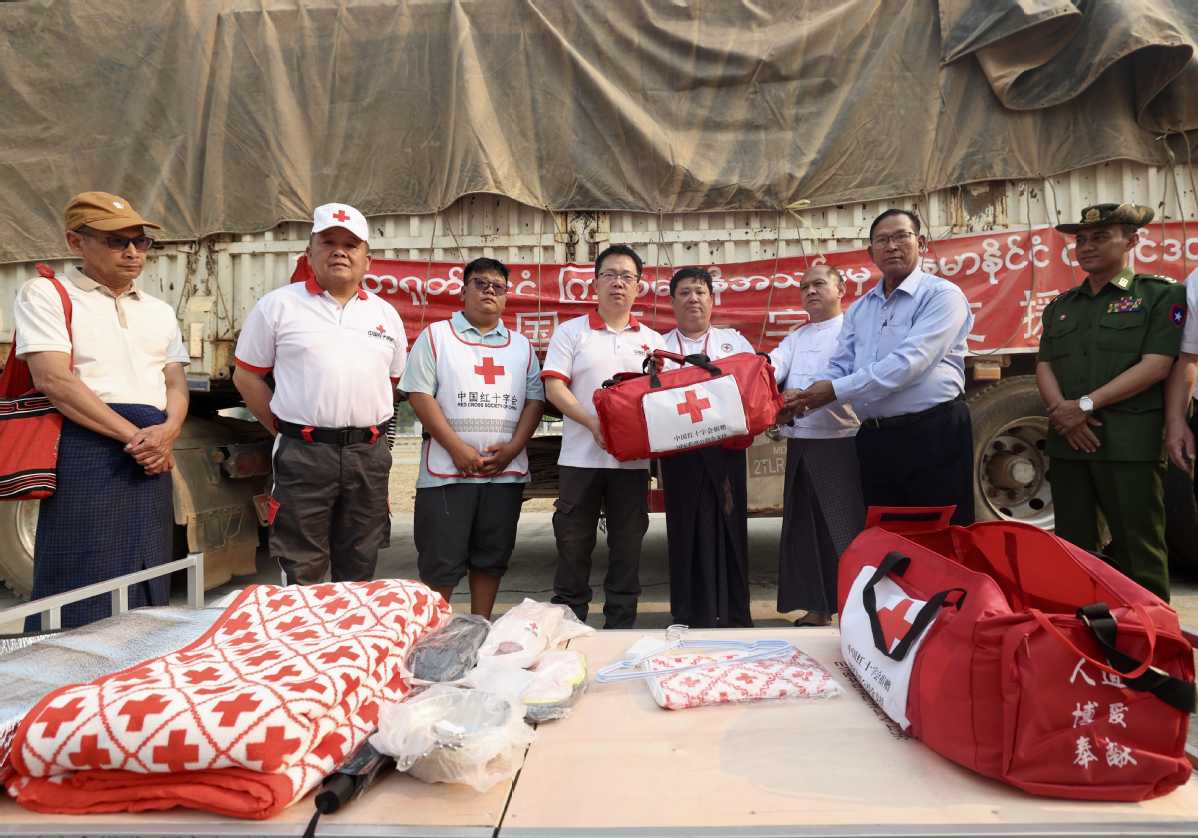
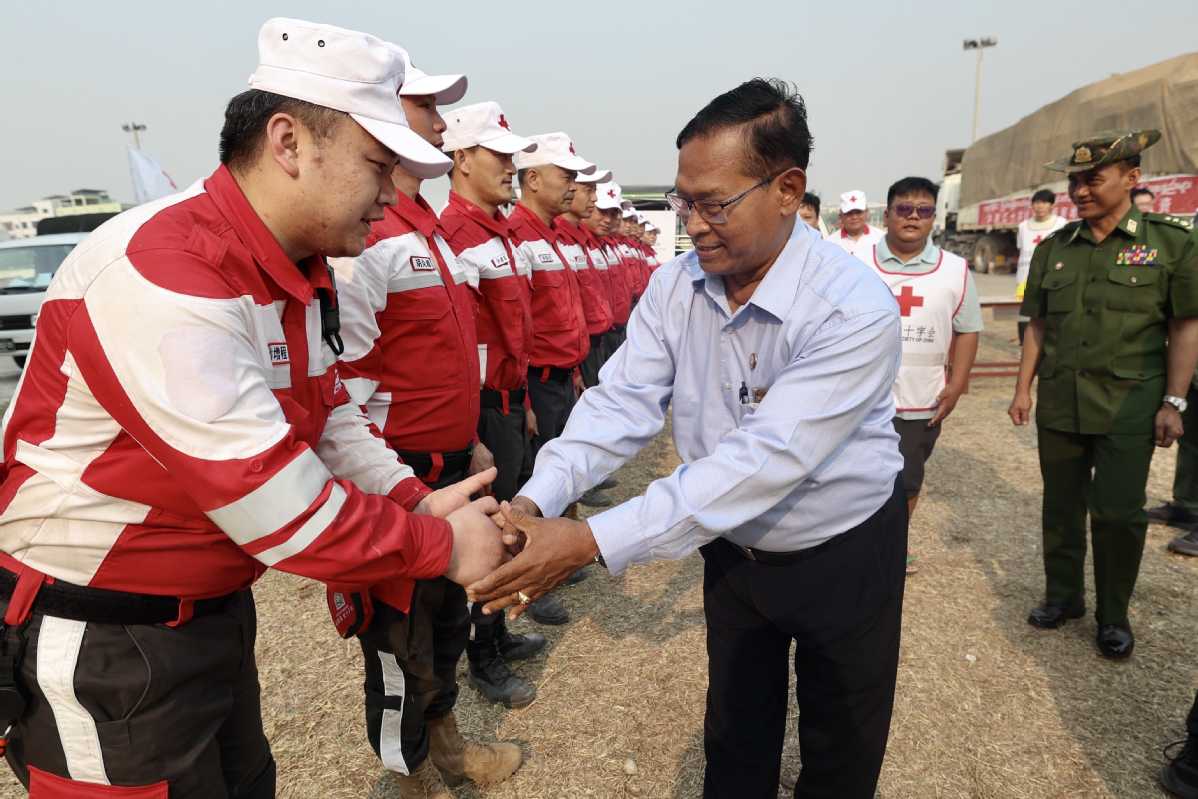
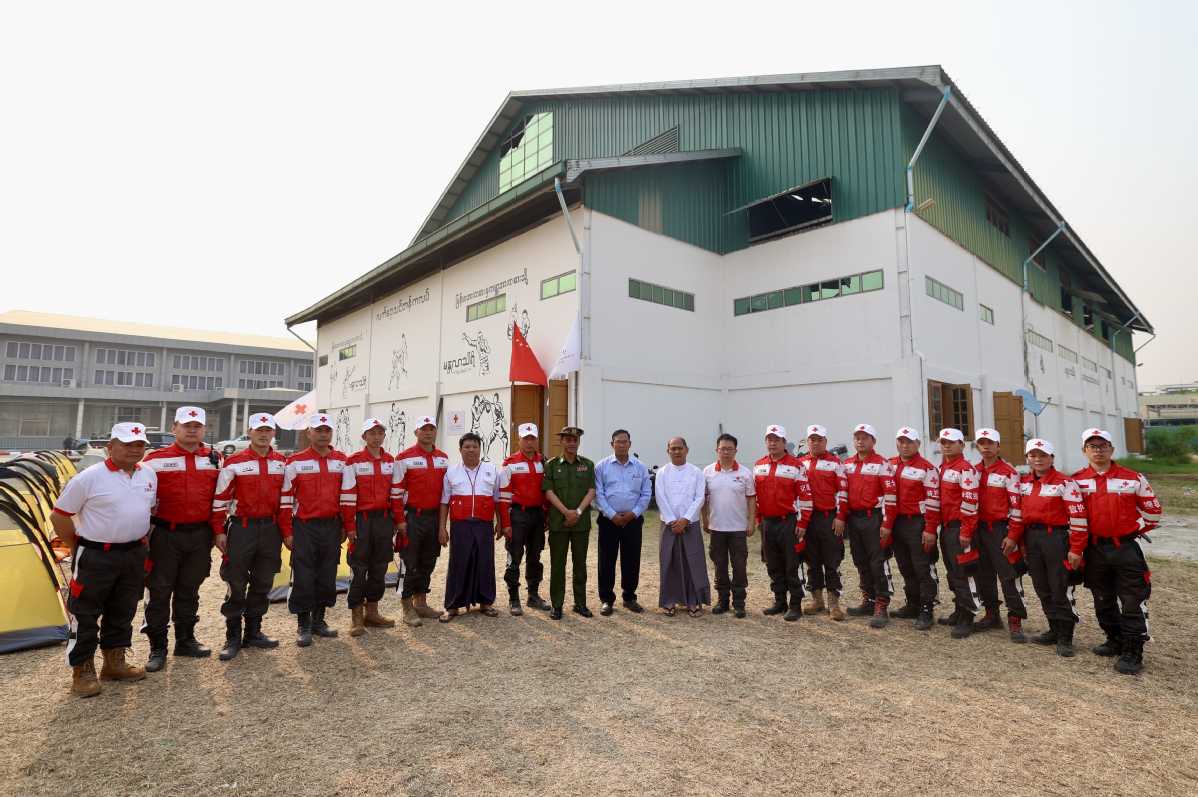
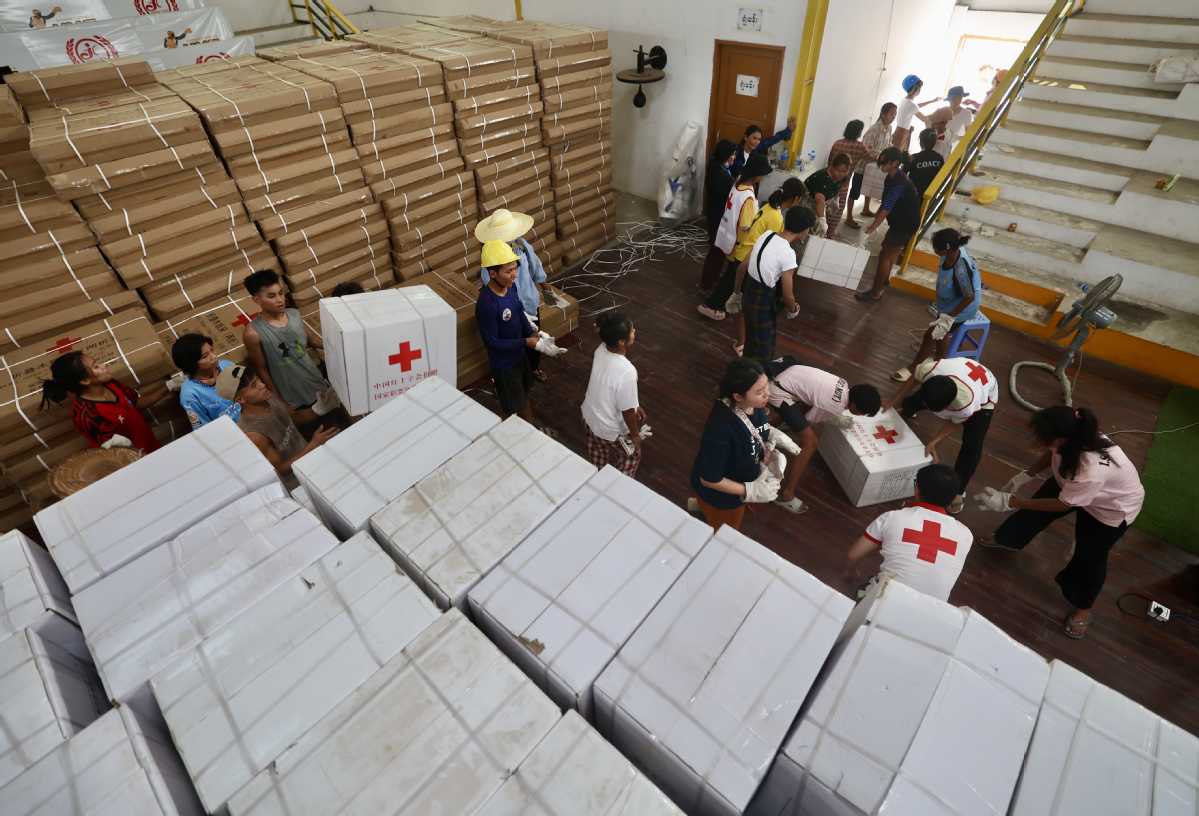
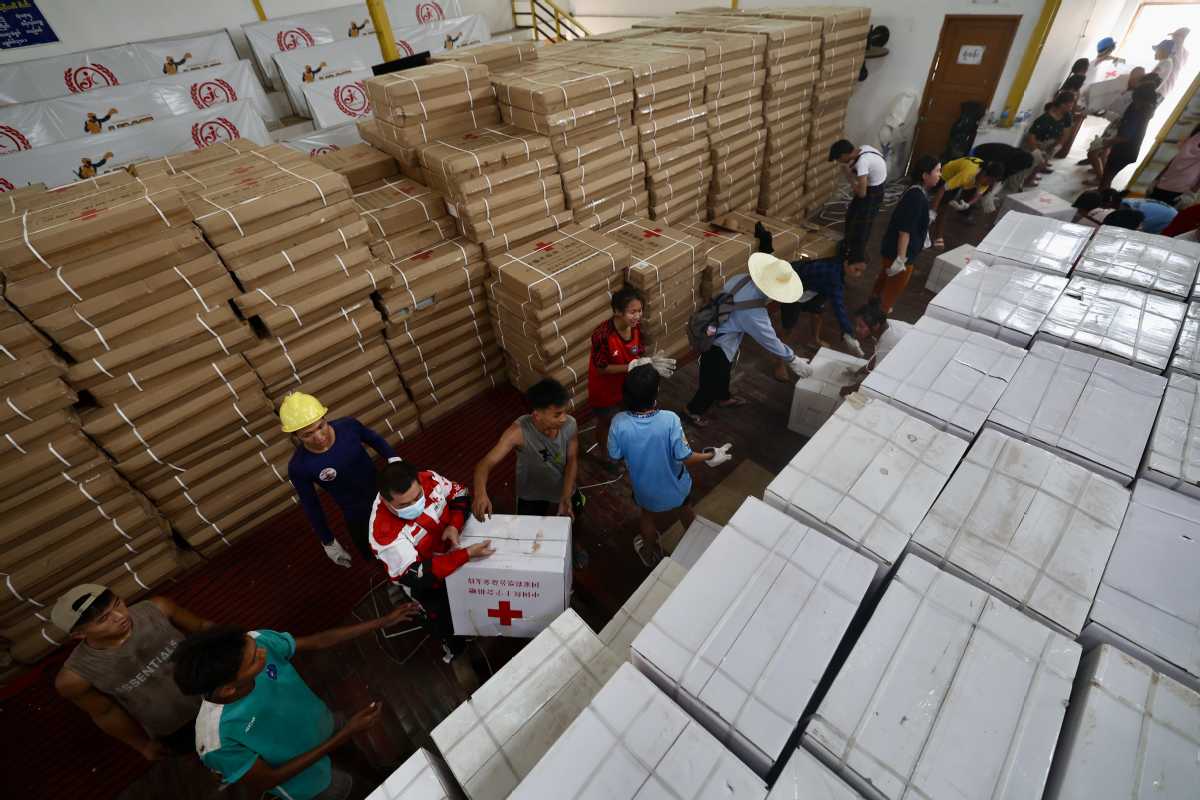
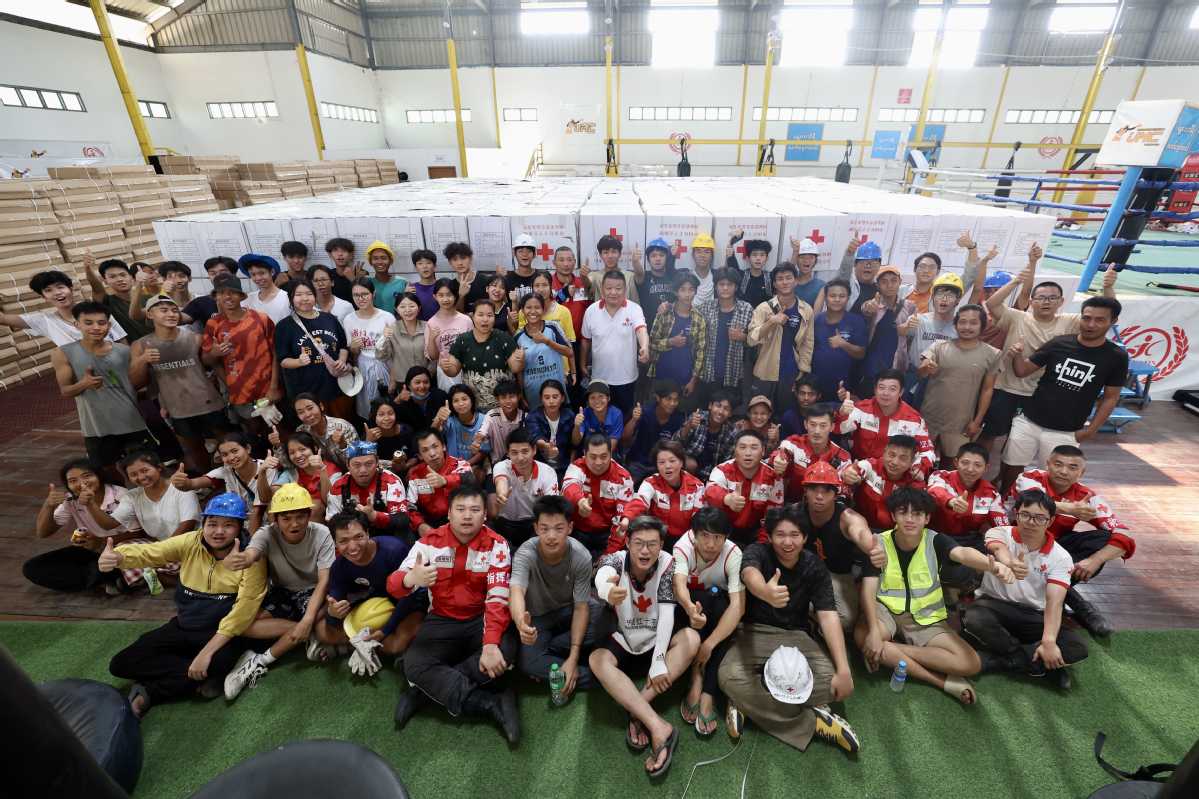
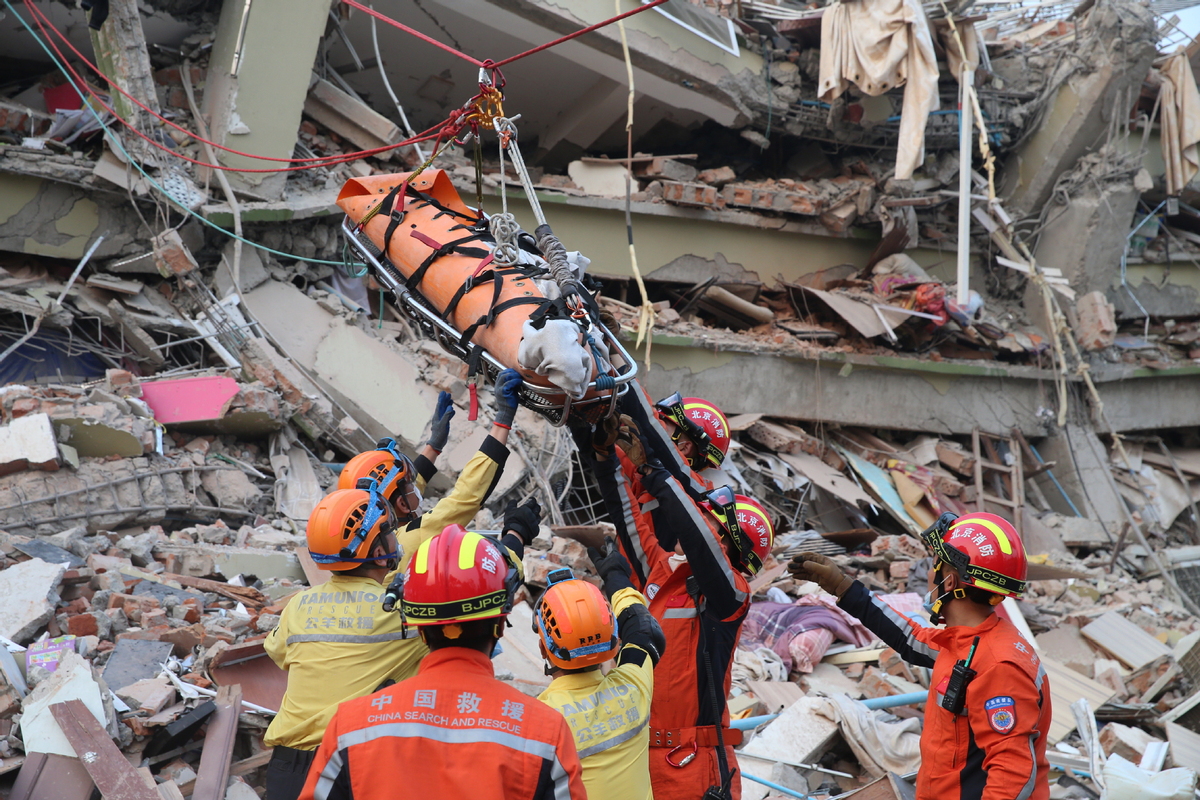
YANGON -- The death toll from a 7.9-magnitude earthquake in Myanmar has risen to 3,085, with 4,715 people injured and 341 reported missing, according to the Information Team of the State Administration Council on Thursday.
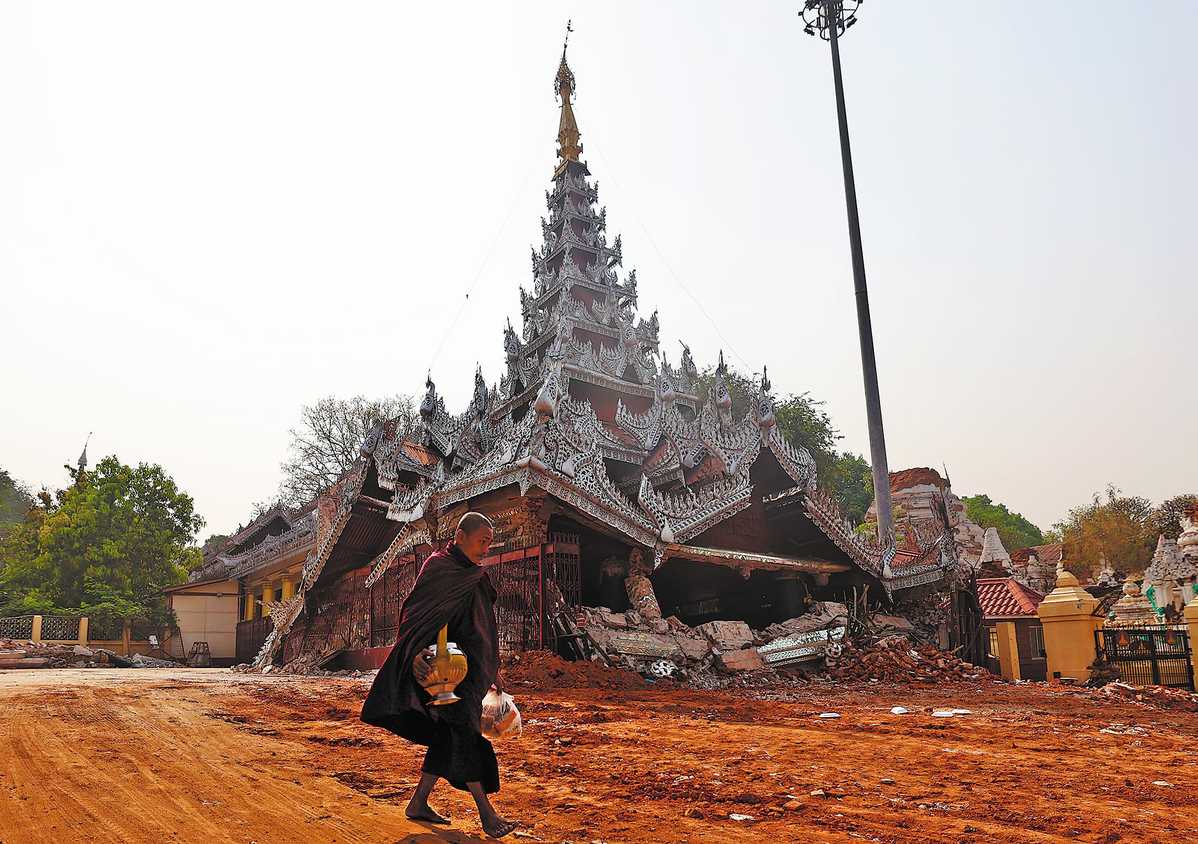
Editor's note: In this weekly feature China Daily gives voice to Asia and its people. The stories presented come mainly from the Asia News Network (ANN), of which China Daily is among its 20 leading titles.
Aid groups in the worst-hit areas of Myanmar said there was an urgent need for shelter, food and water after an earthquake that killed more than 2,800 people as of Tuesday.
The death toll is expected to rise to more than 3,000, Myanmar's military leader Min Aung Hlaing said in a televised address on Tuesday. He said 4,521 people were injured, and 441 were missing.
The 7.7 magnitude quake, which hit around lunchtime on Friday, was the strongest to hit the Southeast Asian country in more than a century, toppling ancient pagodas and modern buildings alike.
"In the hardest-hit areas … communities struggle to meet their basic needs, such as access to clean water and sanitation, while emergency teams work tirelessly to locate survivors and provide lifesaving aid," the United Nations Office for the Coordination of Humanitarian Affairs said.
Drinking water, hygiene, food, shelter and medicine are the most critical needs following extensive damage to buildings, roads and bridges, said Marcoluigi Corsi, acting humanitarian and resident coordinator of the UN following a two-day visit.
"Having lived through the terror of the earthquake, people now fear aftershocks and are sleeping outside on roads or in open fields," a worker from the International Committee of the Red Cross in Mandalay said in a report.
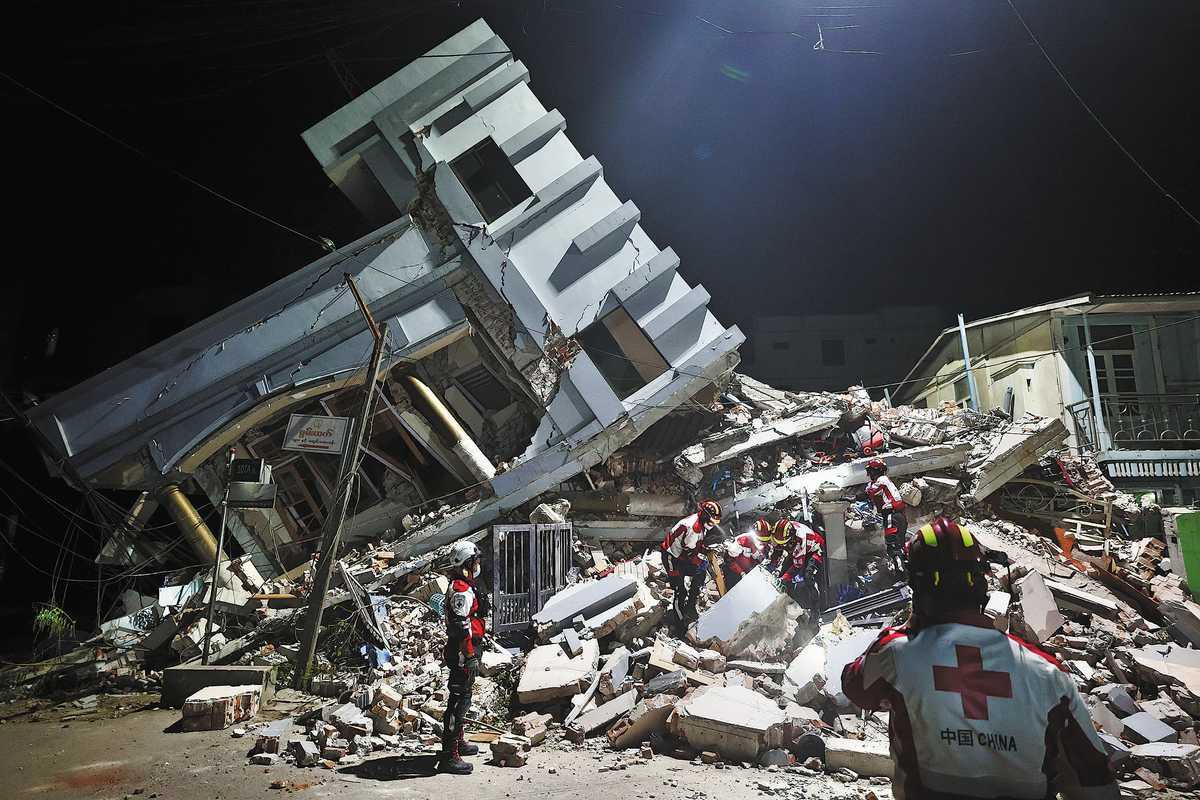
"We remain, of course, deeply committed to reaching people in Myanmar who need aid," UN spokesperson Stephane Dujarric said. "And we must act swiftly to provide relief before the upcoming monsoon season, which, of course, will even worsen this horrendous crisis."
Huge impact
Scientists emphasized the seismic event's significant force and the factors contributing to its impact.
US geologist Jess Phoenix described the earthquake's energy release as equivalent to 334 atomic bombs, warning that aftershocks will continue to pose a significant threat for months.
She highlighted the ongoing collision of the Indian and Eurasian tectonic plates as a continuing source of seismic activity.
The Science Media Centre in the United Kingdom has compiled expert commentary, revealing a consensus on the earthquake's destructive potential.
Ian Watkinson, scholar from Royal Holloway, University of London, echoed these concerns, noting the earthquake's likely propagation along the Sagaing Fault, potentially up to 200 kilometers.
He highlighted the vulnerability of Mandalay and other regional cities, which have experienced rapid high-rise concrete construction, often on the floodplains of the Irrawaddy River.
Giving aid
Rescue workers, sniffer dogs, paramedics and millions of dollars in aid have begun arriving in Myanmar after a massive earthquake ravaged much of the country.
China has announced $14 million in assistance for Myanmar, including 1,200 tents, 8,000 blankets and 40,000 first aid kits.
Chinese teams that arrived 18 hours after the quake and more than 400 Chinese personnel are now on the ground in the region.
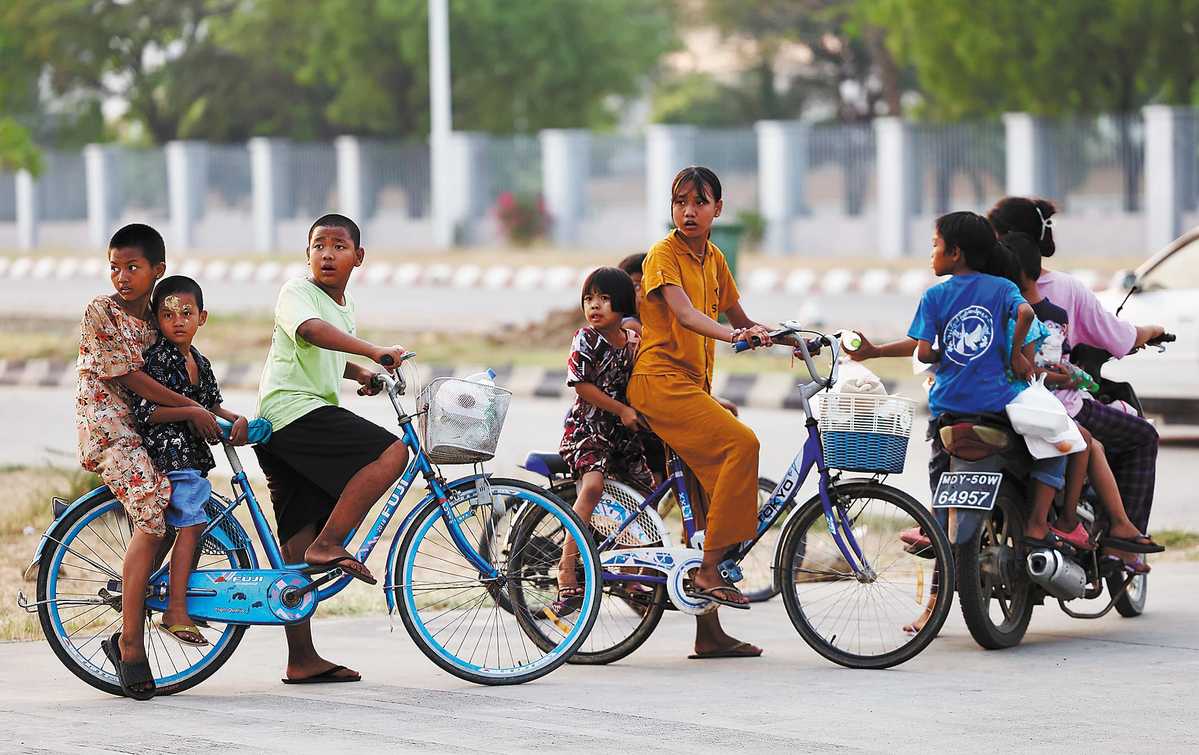
China also has multiple teams in Thailand, according to Xinhua News Agency.
According to the China International Development Cooperation Agency, the initial supplies included tents, blankets and first aid kits.
The United States pledged $2 million in aid "through Myanmar-based humanitarian assistance organizations".
It said in a statement that an emergency response team from USAID, which is undergoing massive cuts under the US administration, is being sent to Myanmar.
Two Russian aircraft carrying 60 rescue workers, four dogs, ambulances and rescue vehicles arrived in Myanmar's capital Nay Pyi Taw on Sunday, Myanmar's state broadcaster MRTV reported.
The Japanese government has dispatched a five-person assessment party that includes medical professionals to lay the groundwork for a larger emergency rescue team.
India sent a search and rescue team, medical professionals and a military transport aircraft filled with blankets, hygiene kits, food packets and other essential items on Saturday.
Vietnam has sent a team of more than 100 rescuers, medical staff and firefighters along with aid and sniffer dogs.
Thailand, which was also hit by the quake, has sent 55 air force personnel, including medics and search and rescue specialists, as well as medical supplies to Myanmar.
Indonesia's military said in a statement on Monday that it was sending emergency teams, including search and rescue workers, to Myanmar, as well as tents, food and logistical supplies.
Singapore has sent an 80-member team to assist with disaster rescue efforts. The government contributed about $112,000 as seed money to support the fundraising efforts of the Singapore Red Cross.
Agencies via Xinhua
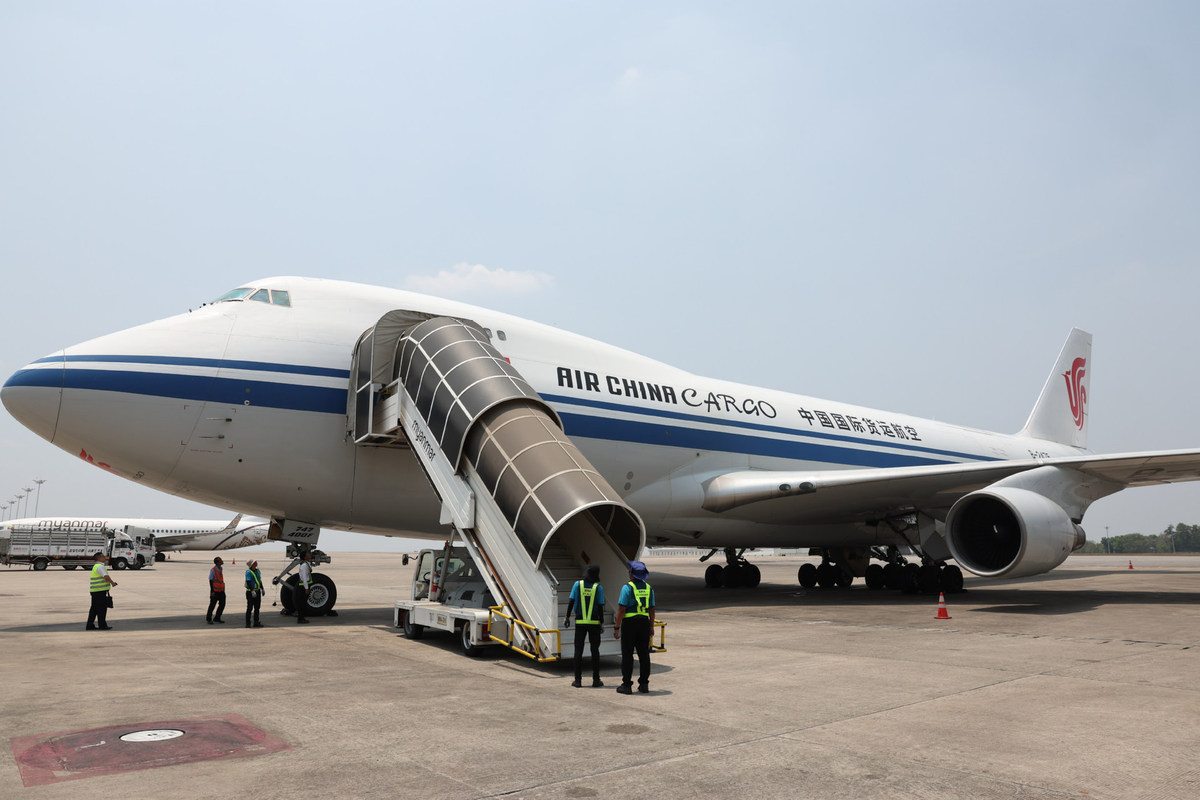
A second batch of disaster-relief supplies from the Chinese government arrived in Yangon on Thursday after a 7.9 magnitude earthquake struck Myanmar on March 28.
The shipment includes 800 tents, 2,000 blankets, 3,000 boxes of biscuits, 2,000 boxes of mineral water, and other urgently needed supplies. The aid was flown from Beijing Capital International Airport to Yangon on a chartered cargo plane on Thursday morning.
The first batch of Chinese disaster-relief supplies arrived in Myanmar on Monday.
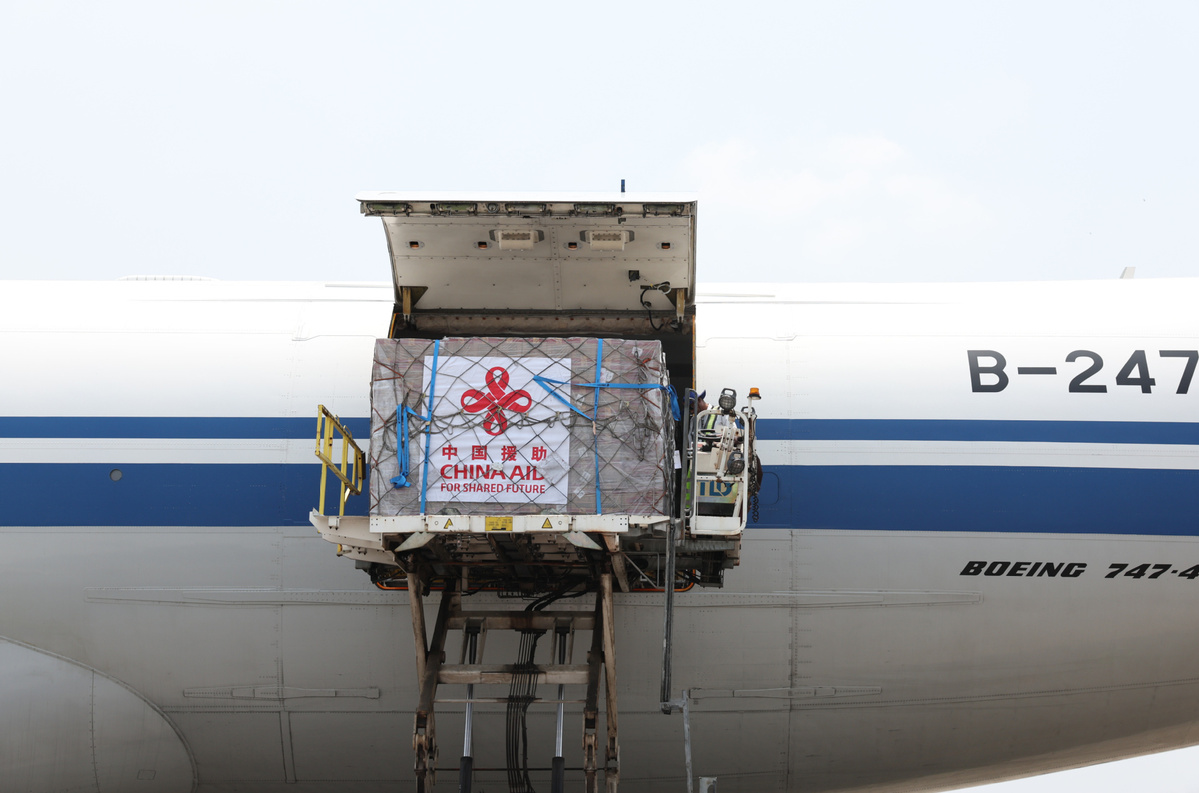
Li Ming, spokesperson for the China International Development Cooperation Agency, said on Wednesday that China is ready to continue providing aid and support to the disaster-stricken people of Myanmar.
"With the joint efforts of China and the international community, the people of Myanmar will secure an early victory over the disaster and the reconstruction of their homeland," Li said.
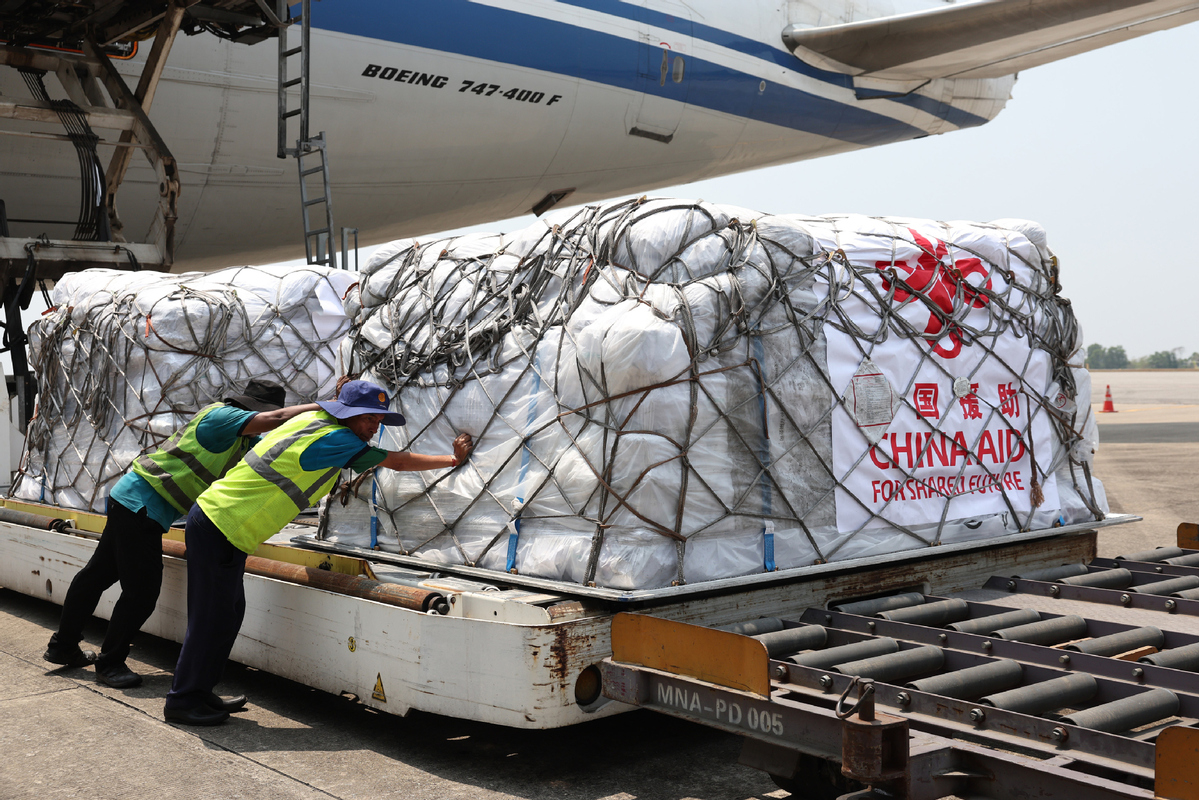
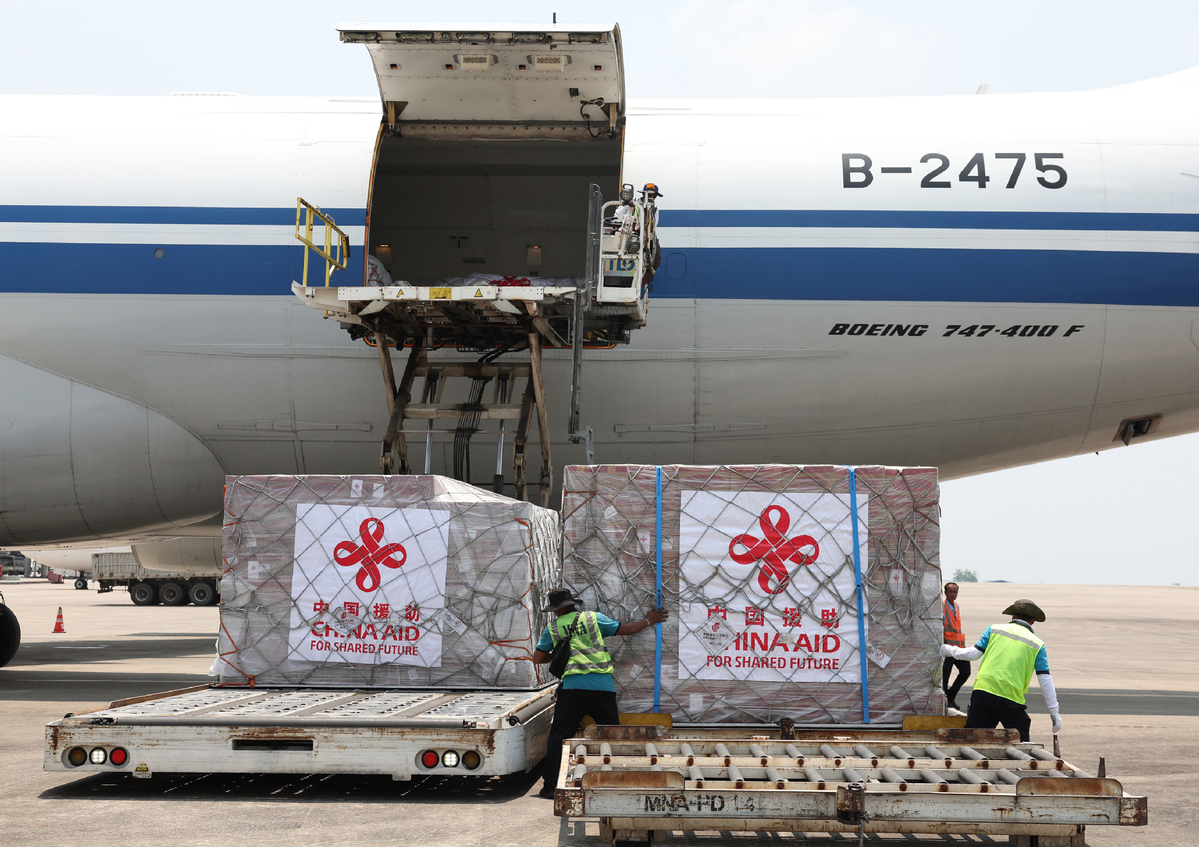
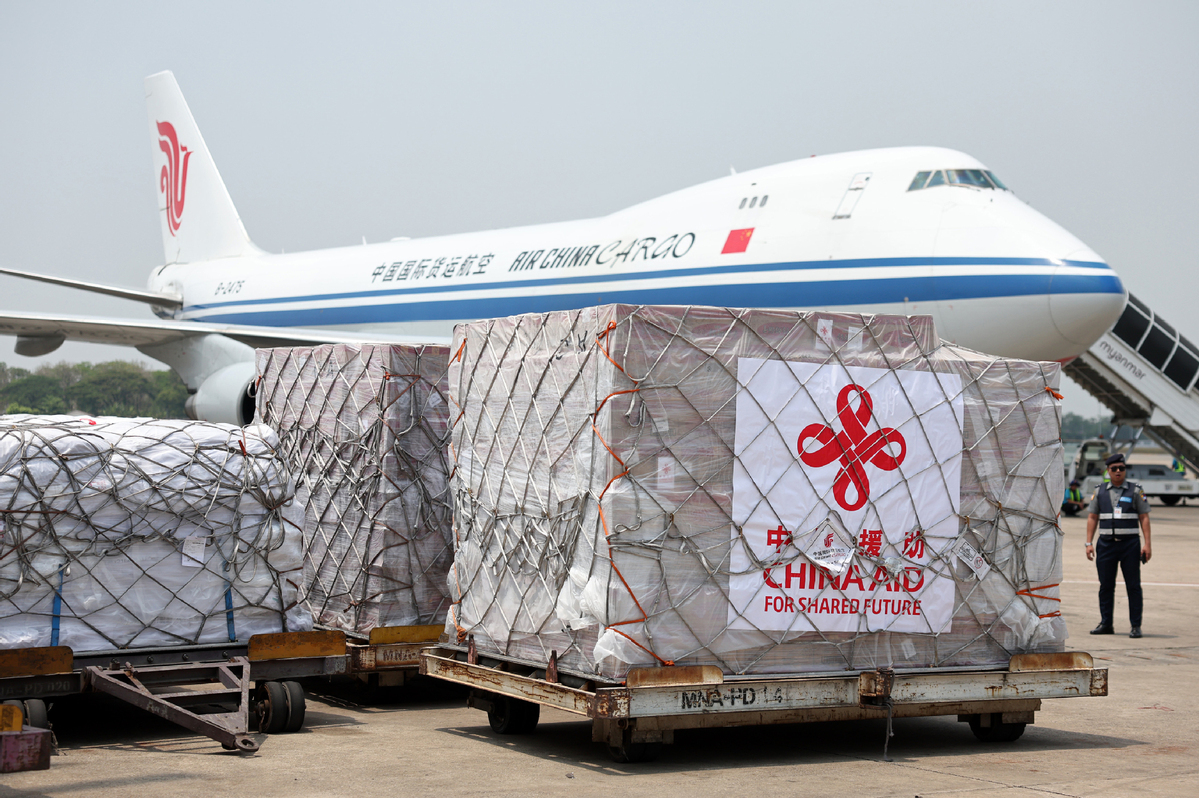
YANGON -- The second batch of emergency humanitarian aid supplies dispatched by the Chinese government arrived at Yangon International Airport in Myanmar on Thursday.
The second batch of aid supplies includes 800 tents, 2,000 blankets, 3,000 boxes of biscuits, 2,000 boxes of mineral water and other urgently needed supplies. The supplies were transported to Yangon by a chartered flight from China.
The first batch of emergency humanitarian aid supplies dispatched by the Chinese government for earthquake disaster relief arrived in Myanmar on March 31.
Li Ming, spokesperson for China International Development Cooperation Agency, said that China is willing to continue providing assistance to the people in the disaster-stricken areas based on Myanmar's needs, supporting their efforts to overcome the disaster as soon as possible.
He expressed confidence that with the joint efforts of China and the international community, the people of Myanmar will surely be able to overcome the disaster and rebuild their homes at an early date.
BEIJING -- The Chinese government dispatched the second batch of emergency humanitarian earthquake relief supplies to Myanmar from Beijing Capital International Airport on Thursday morning, according to the China International Development Cooperation Agency.
The second batch of aid supplies includes 800 tents, 2,000 blankets, 3,000 boxes of biscuits, 2,000 boxes of mineral water and other urgently needed supplies. The supplies are being transported to Yangon by a chartered flight from China. The first batch of emergency humanitarian aid for earthquake disaster relief arrived in Myanmar on March 31.
Li Ming, spokesperson for China International Development Cooperation Agency, said that China is willing to continue providing assistance to the people in the disaster-stricken areas based on Myanmar's needs, supporting their efforts to overcome the disaster as soon as possible.
He expressed confidence that with the joint efforts of China and the international community, the people of Myanmar will surely be able to overcome the disaster and rebuild their homes at an early date.
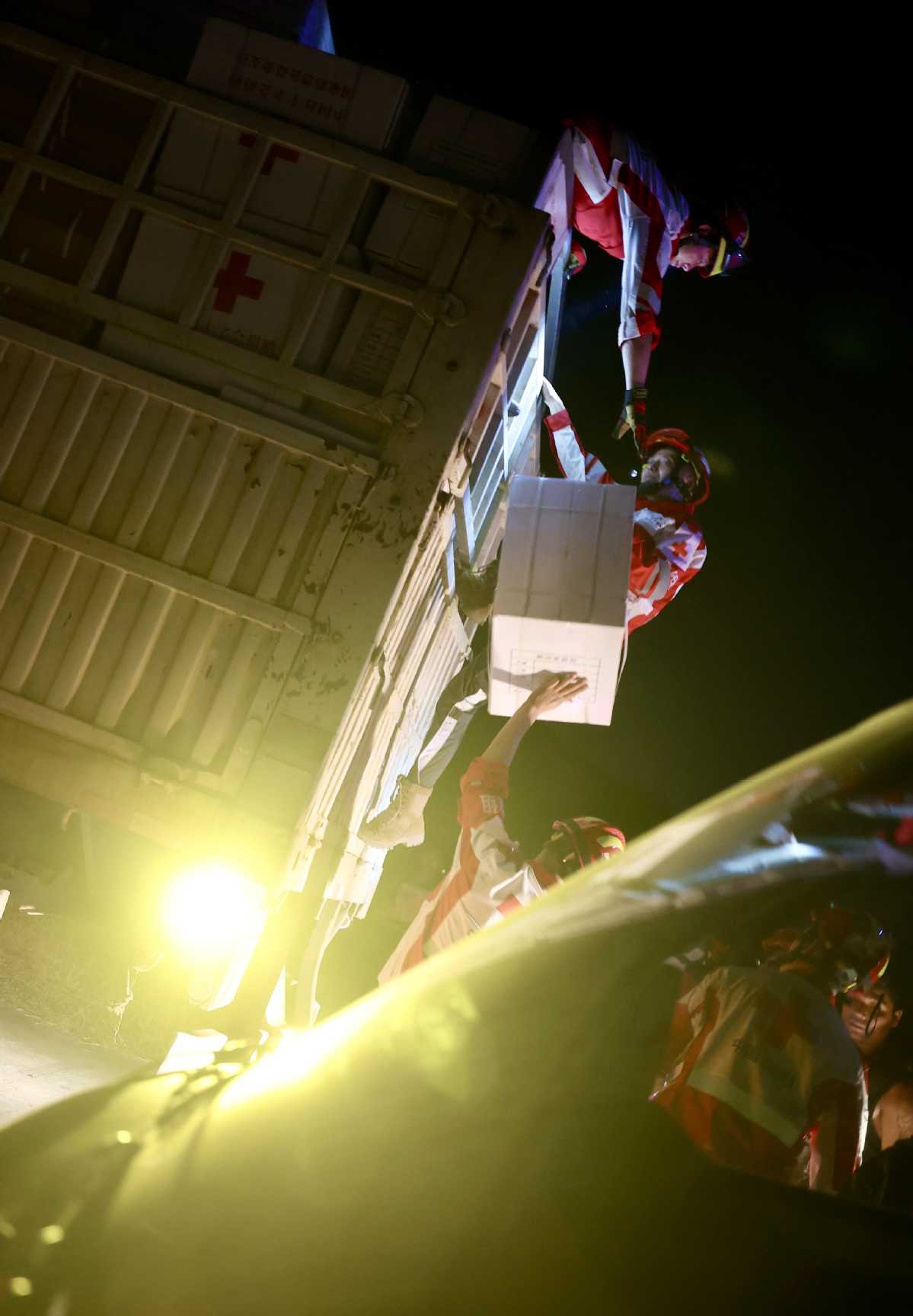
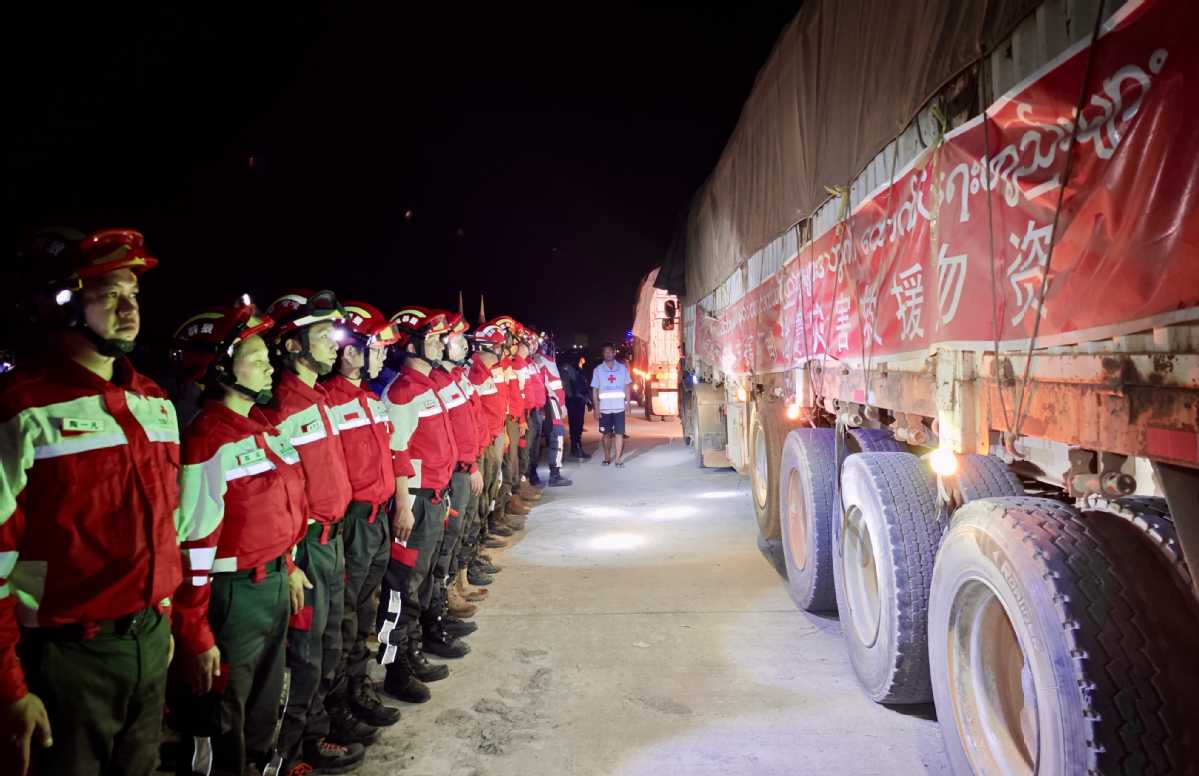
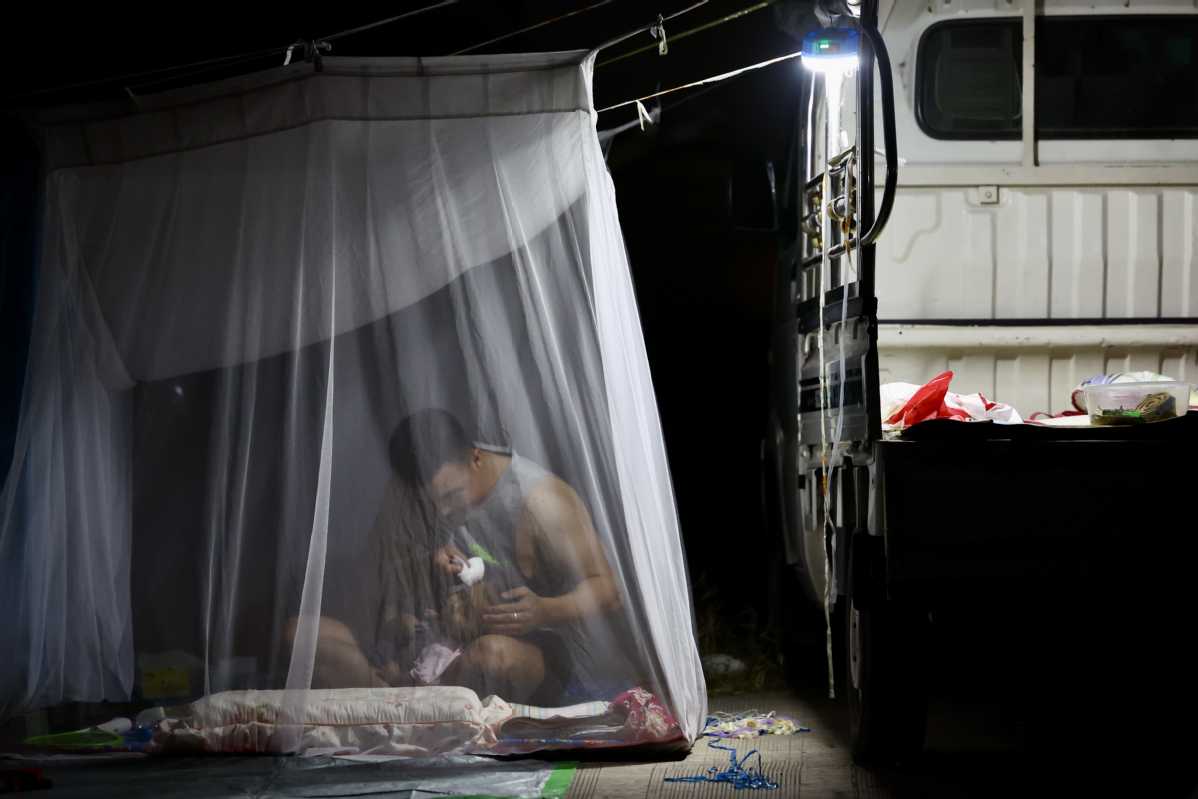
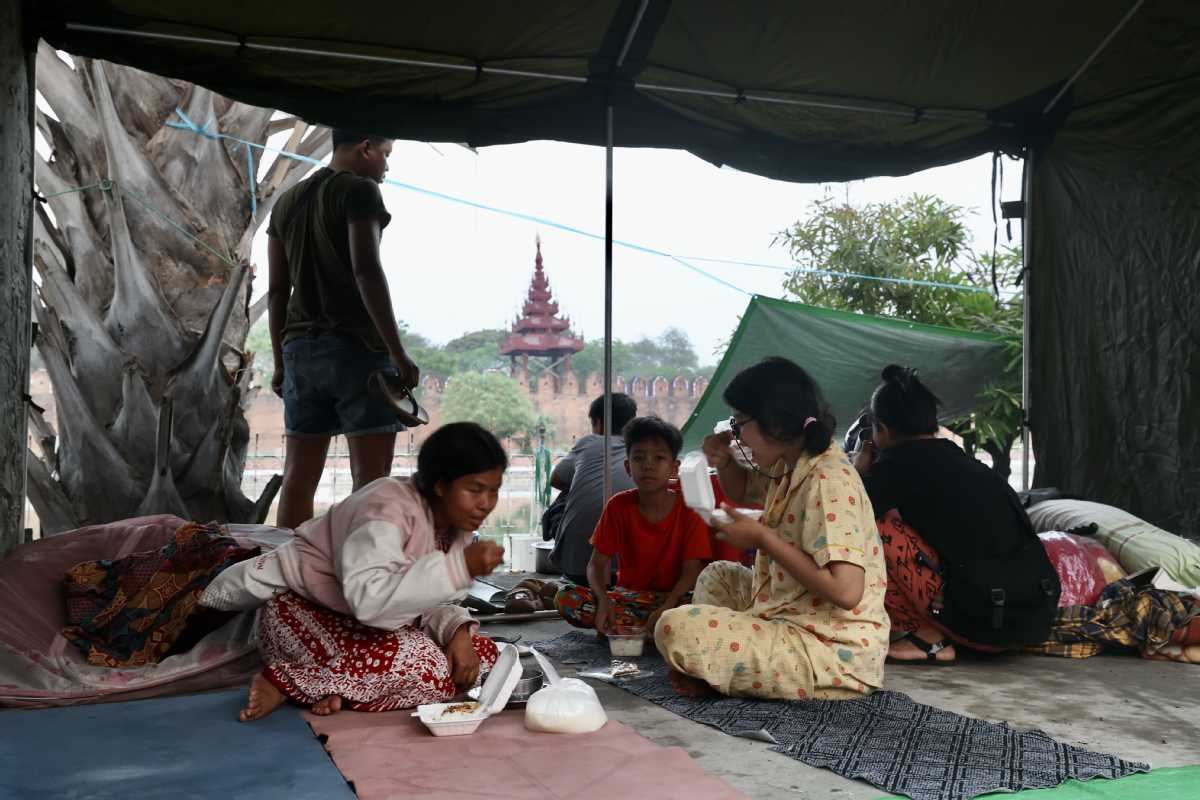
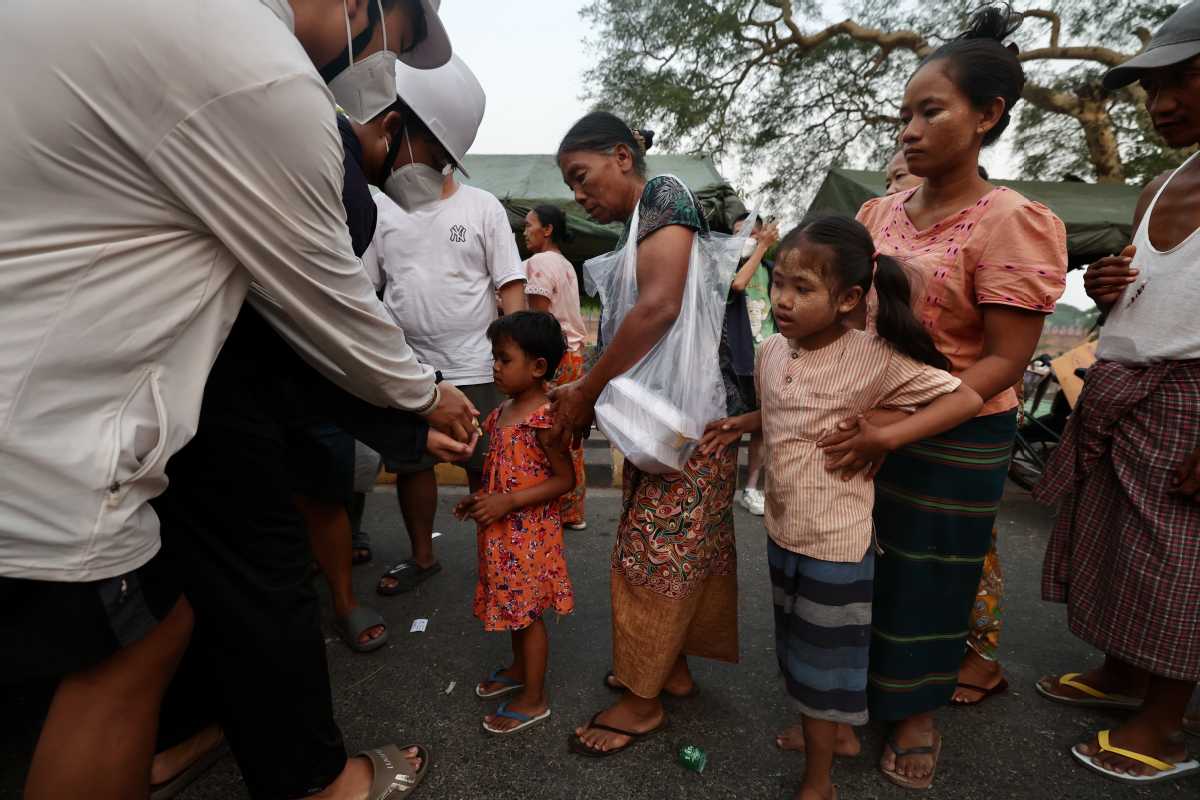
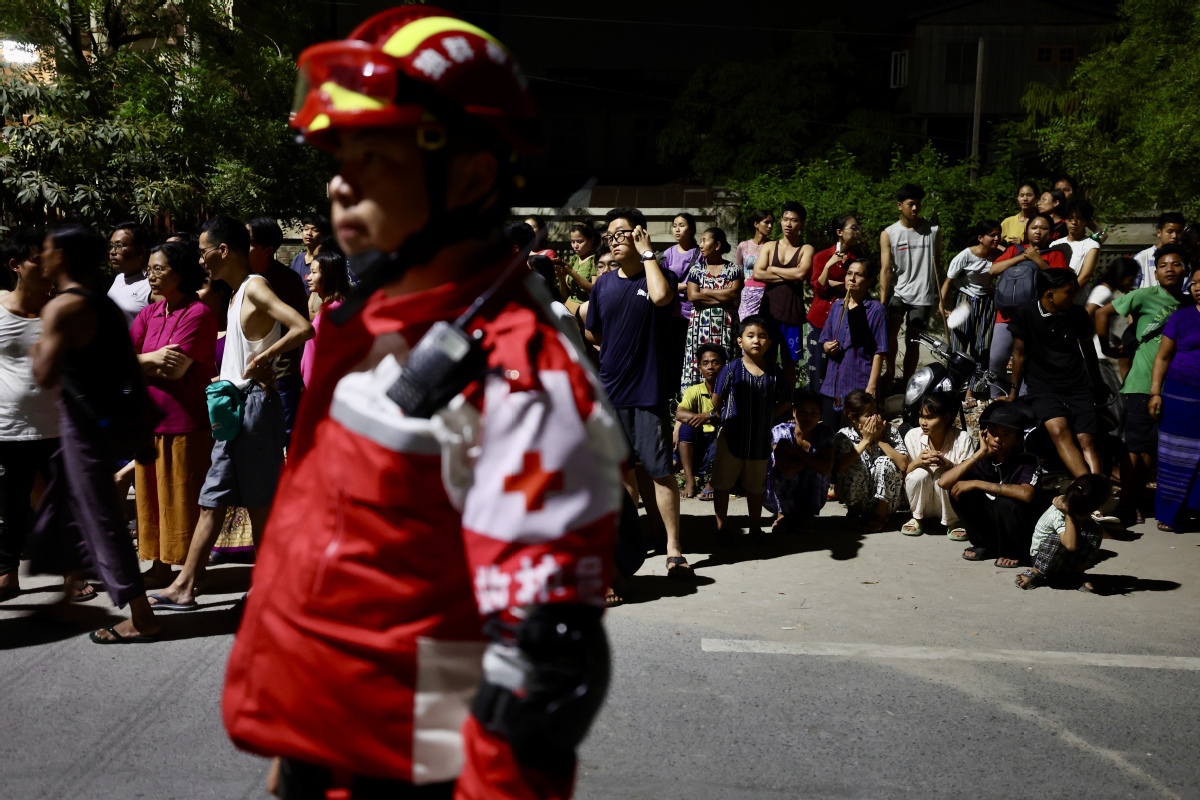
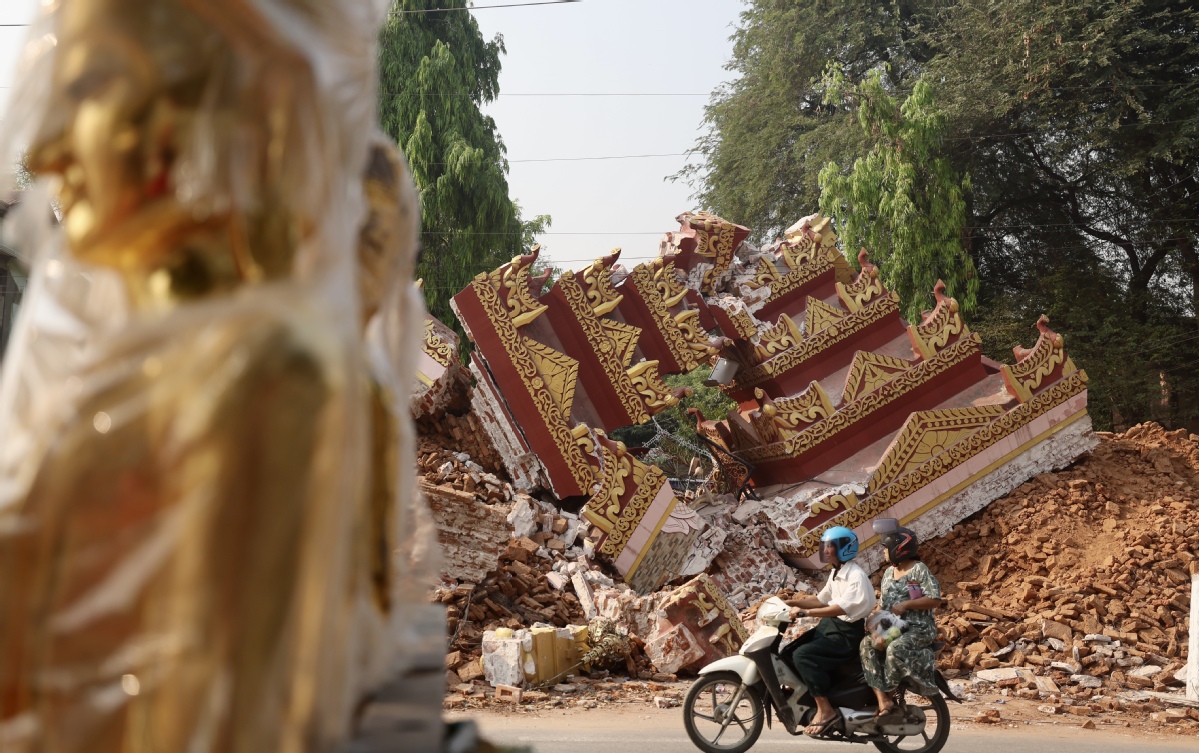
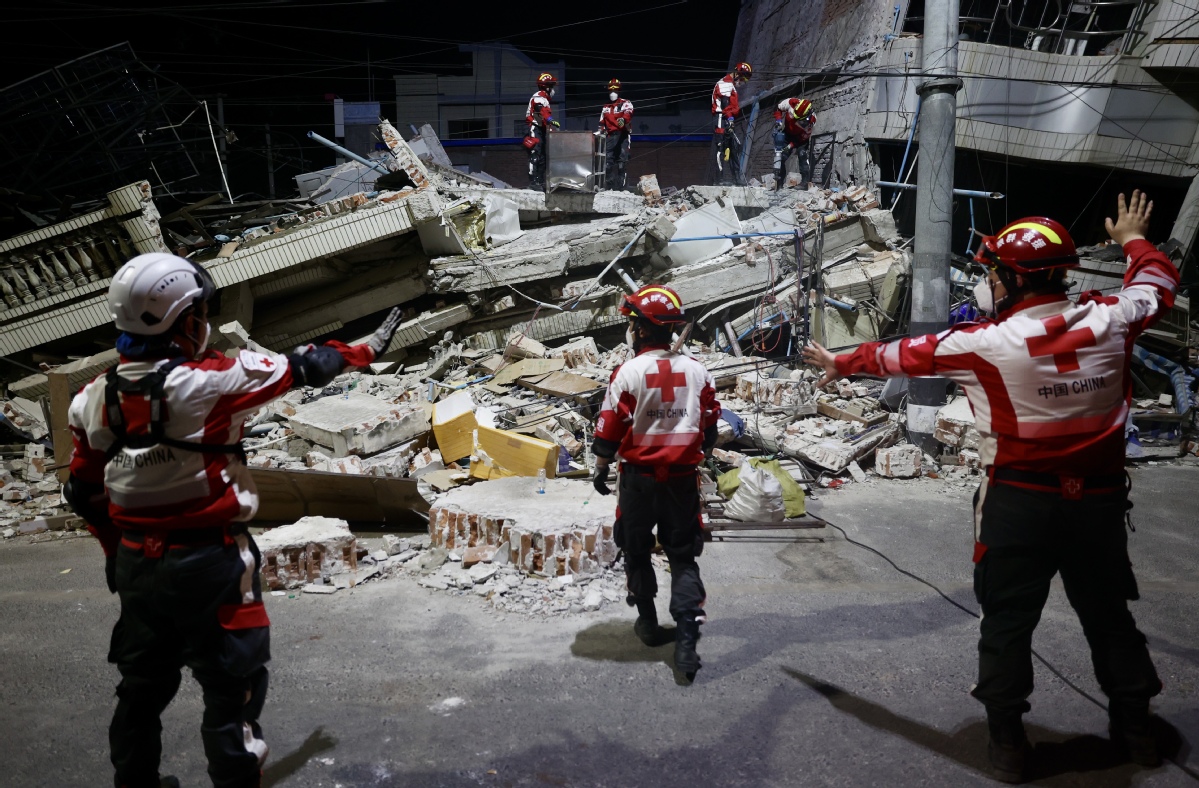
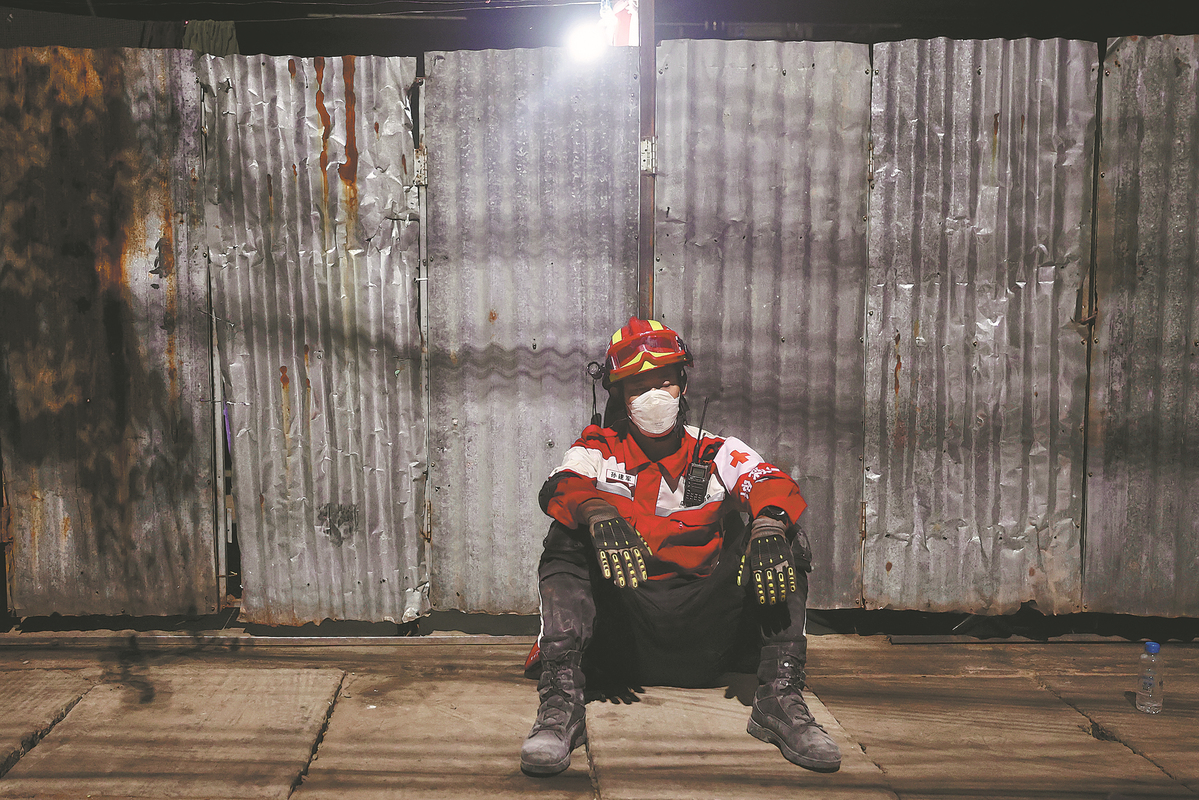
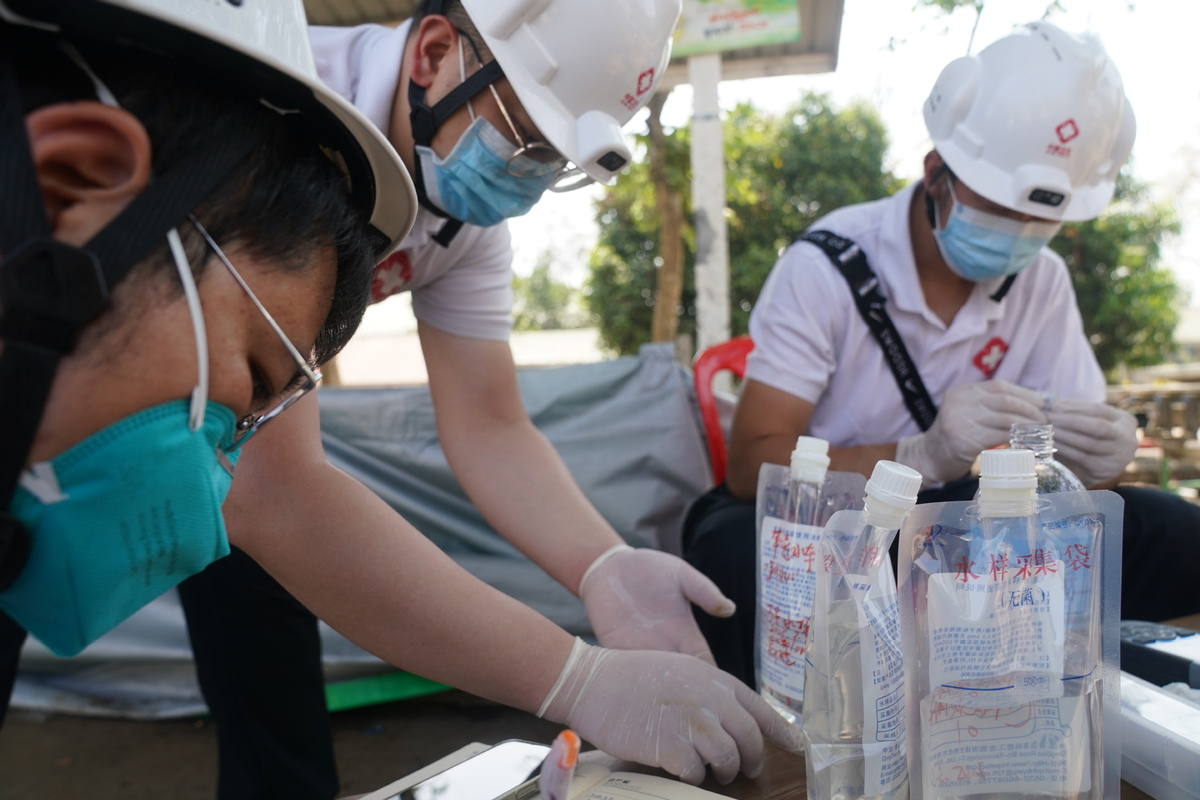
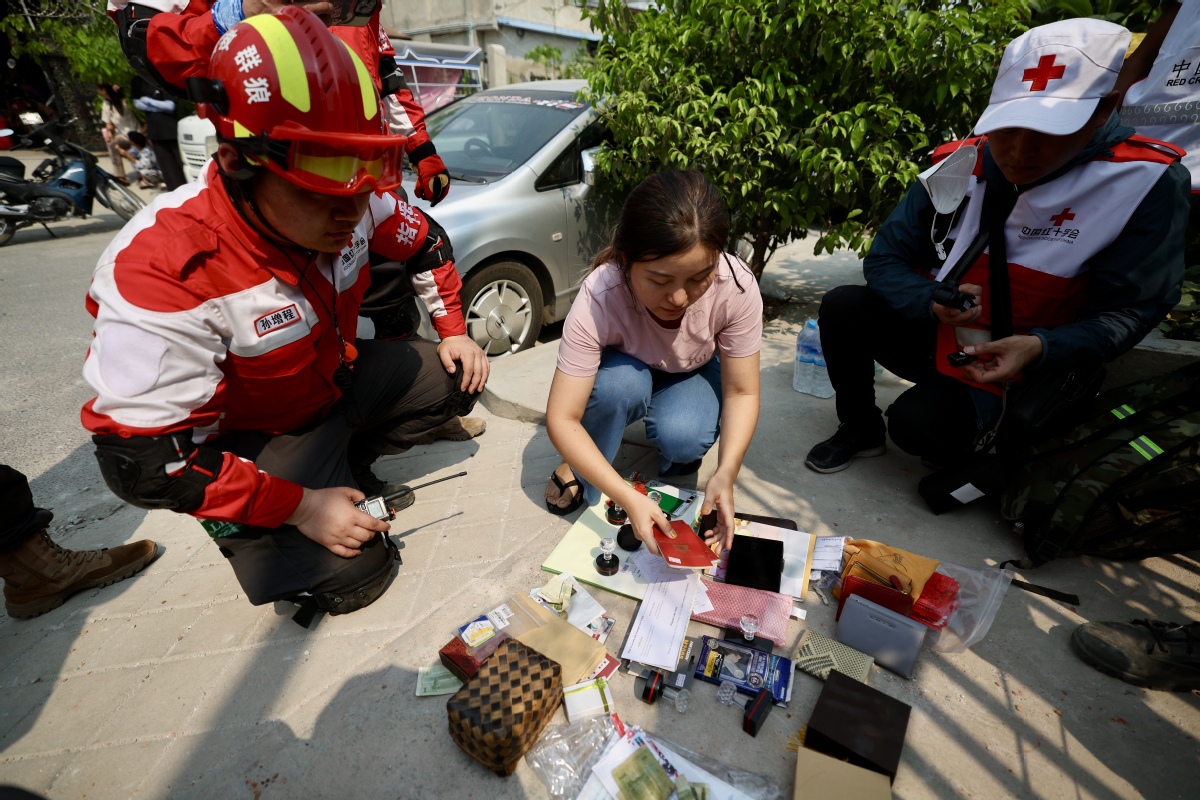
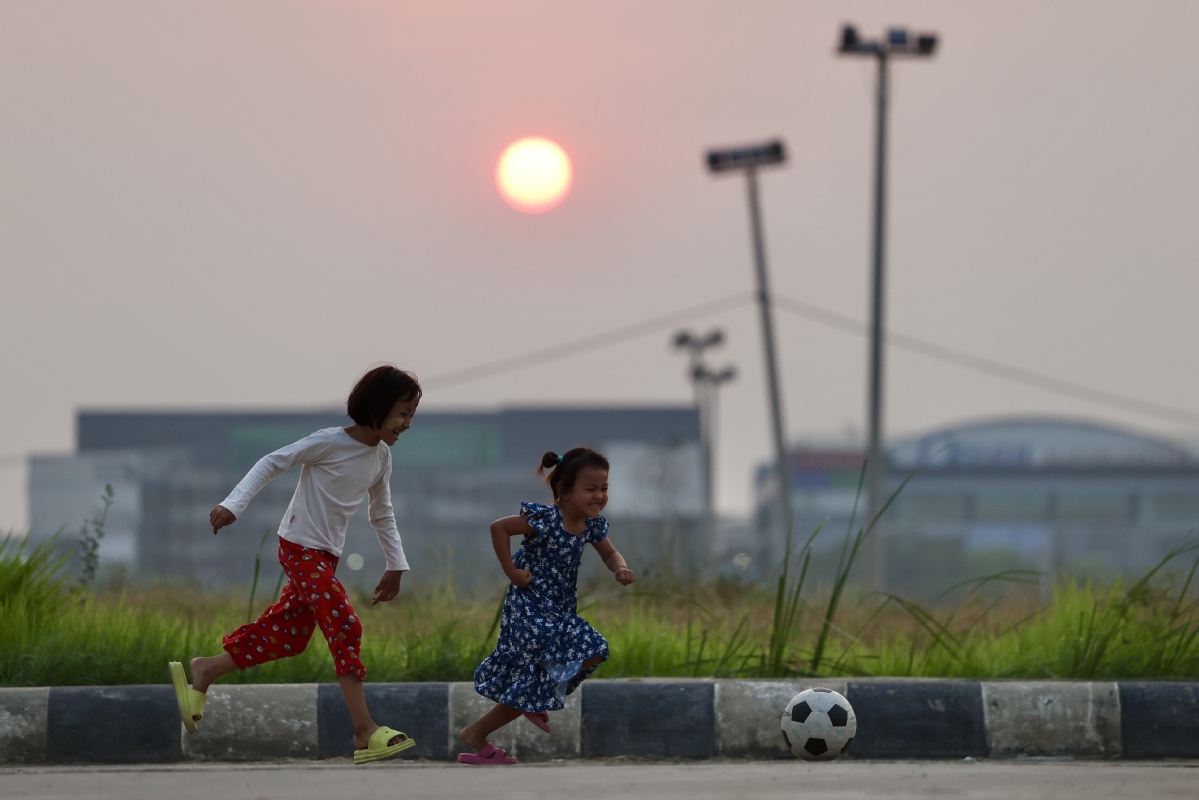
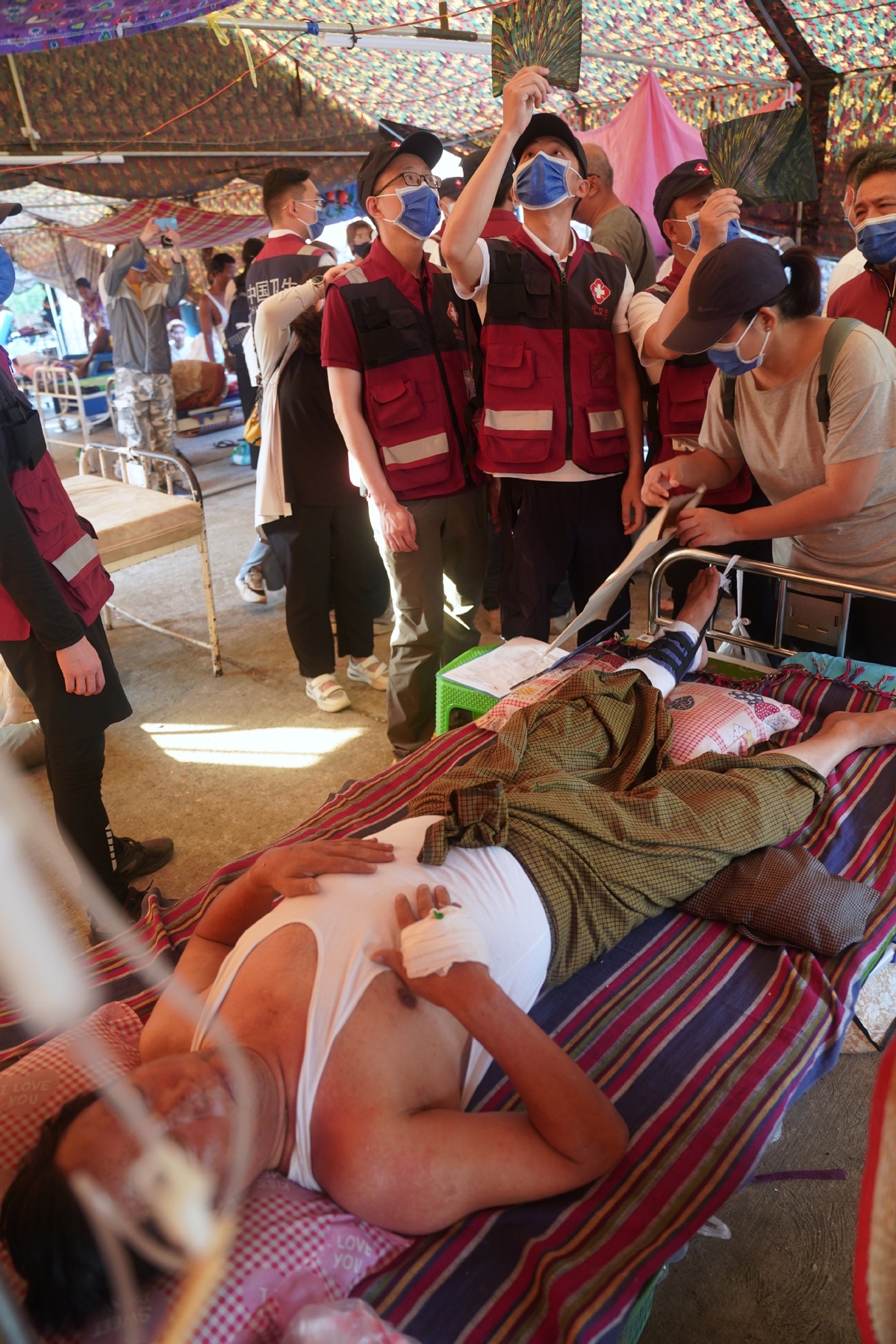
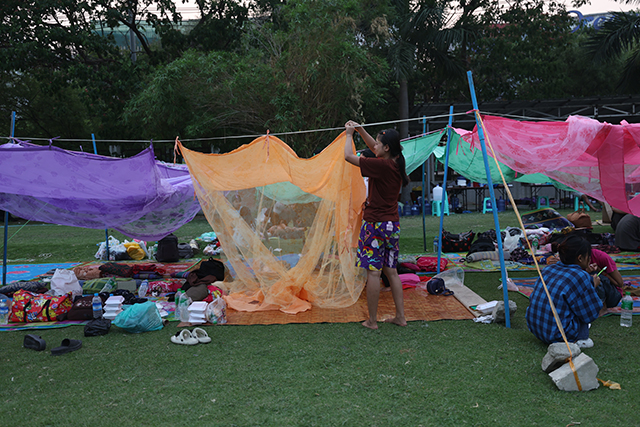

At 6 am on Wednesday, I woke up alongside hundreds of earthquake survivors near the moat of Mandalay Palace. Almost 36 hours had passed since my arrival in Myanmar, which was hit by a 7.9 magnitude earthquake on Friday.
The Chinese rescue teams were already hard at work, with generators humming and vehicles bustling. Food and water had been quietly placed outside the pitched mosquito net tents, my temporary residence, likely brought by local volunteer organizations or individual volunteers in the early hours of the day.
Across the street, a woman in her 80s lay trapped under rubble for over four days. Members of the Blue Sky Rescue Team from China have been tirelessly digging for two days and two nights in the deep hope of finding her alive. Around Tuesday midnight, I overheard them discussing their next steps.
To my left, the elderly woman's son and his family are taking refuge. Upon learning that I am a journalist from China, they kindly brought me a pillow and a blanket. As I write these words, they have even brought me hot fried dough sticks.
The powerful earthquake has sent the country reeling. As of Wednesday afternoon, more than 2,800 people were dead and over 4,600 were injured, and these figures are expected to rise. What the disaster-stricken people now face includes the loss of generational heritage and months of living in makeshift camps by the river.
Yet, as the sun rises, I see children playing, some residents washing their clothes in the river and hanging them on roadside railings, and many others still asleep. There is a rare sense of tranquility that cannot be ignored.
On this special journey, I have experienced the unwavering unity of the Chinese people, and the trust Myanmar's people have placed in China.
Upon my arrival in Myanmar with members of the Chinese Blue Sky Rescue Team on Monday, customs officials greeted us with respect and gratitude, the Blue Sky Rescue Team of Myanmar and the local chamber of commerce arranged vehicles for us, and the local telecom company provided SIM cards.
All members of the relief and rescue teams at the site have come voluntarily and have paid their own expenses. Zhang Guangrui, a Blue Sky Rescue volunteer from China, told me that upon hearing the news of the earthquake on Friday, he immediately rushed to Bangkok, the capital of Thailand, for a day of rescue work, and then flew nonstop to Myanmar.
To arrive as quickly as possible, he bought tickets for all available flight routes and finally boarded the fastest flight, making him one of the first advance team members to arrive at the disaster site on Sunday.
Local people are actively helping and expressing gratitude to the Chinese rescue teams. Anyone wearing the uniform of Blue Sky Rescue doesn't need to wait in line or even pay at the gas station, and traffic police are clearing the way for the vehicles of the Chinese teams. When rescue workers are in need of heavy machinery such as excavators, local companies are providing this equipment to the best of their abilities.
However, the Blue Sky Rescue Team is very disciplined and strictly adheres to principles. Its members have refused gifts and insist on paying all their expenses.
As relief materials and donations from China pour in and post-disaster recovery efforts gradually begin, I sincerely hope to witness more miracles of life. I also hope that Myanmar, bearing the scars of a devastating earthquake, will soon regain its beauty and overall tranquility.
Xu Nuo in Beijing contributed to this story.
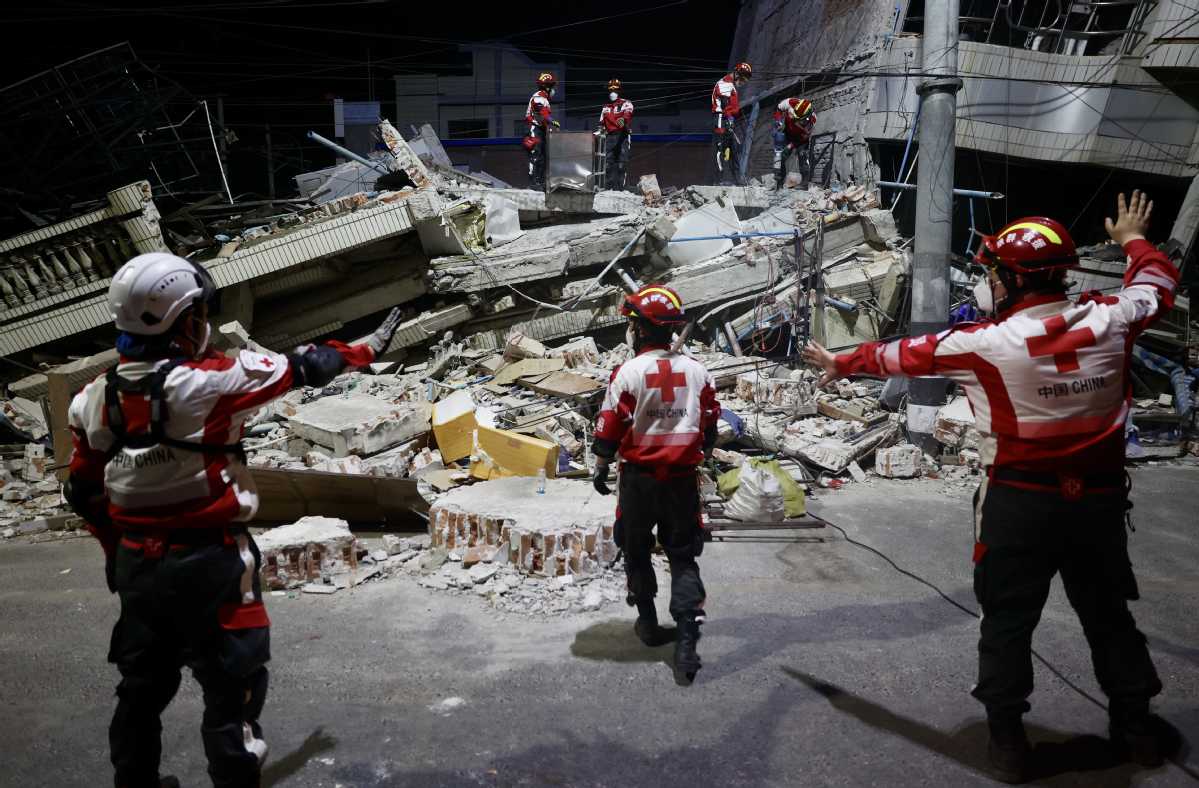
China's swift response to the earthquake in Myanmar and its continuous support for rescue and relief efforts, including the deployment of the largest number of rescue teams and personnel, have been widely recognized by the government and people of the Southeast Asian country.
Li Ming, spokesman for the China International Development Cooperation Agency, said on Wednesday that nearly 30 Chinese rescue teams, comprising over 500 personnel, are currently assisting rescue and relief efforts in Myanmar.
"We deployed rescue teams within the critical 72-hour window. Following the principle of proximity, a rescue team from Yunnan province reached Myanmar within 18 hours of the earthquake," Li said.
As of Wednesday evening, Chinese teams had rescued nine survivors, according to China's Ministry of Emergency Management.
The ninth survivor — a man trapped under rubble in Mandalay for over 120 hours — was rescued by the Chinese national rescue team and the China International Search and Rescue Team at 5:40 pm local time. He was in stable condition at the time of rescue, the ministry said.
On Tuesday, Mandalay Mayor U Kyaw Hsan expressed his gratitude in person to members of the Chinese civil rescue team Ramunion.
During the dayslong cross-border rescue operation, the team searched 26 collapsed buildings, rescuing five survivors and recovering 12 bodies in 72 hours. Local residents spontaneously brought tea and fruit for the team as a gesture of appreciation.
According to Li, despite disruptions to transportation and communication networks, the first shipment of China's emergency humanitarian aid, including 1,200 tents, 8,000 blankets and over 40,000 first-aid kits, was delivered to Myanmar's capital, Nay Pyi Daw, on Tuesday for distribution among displaced residents.
The second shipment of relief supplies from China, including 800 tents, 2,000 blankets, 3,000 boxes of biscuits and 2,000 boxes of bottled water, is scheduled to be shipped on Thursday, he said.
The Red Cross Society of China has also provided 1.5 million yuan ($206,000) in cash aid, while Yunnan has donated 6.1 million yuan worth of disaster relief supplies, he added.
In Mandalay, many people whose homes were destroyed in the magnitude 7.9 earthquake that struck Myanmar on Friday are now living outdoors.
"We need temporary shelters such as tents," said U Kyaw Kyaw, a resident who is currently sleeping on a mat on the riverbank. "I have seen the rescue teams from China working here. I want to thank them."
Shen Tingchong, from the Red Cross Society of China, said that while one team is supporting rescue operations, another is preparing for the construction of temporary shelters for the displaced people, including setting up toilets and water supply facilities.
"We will also carry out a disinfection drive, as post-disaster infectious diseases also need to be taken seriously," Shen added.
Zhang Guangrui, leader of the Blue Sky Rescue Team from China, said his squad has been searching for two days for an 84-year-old woman trapped under a collapsed building in Mandalay. "We are sparing no efforts. As victims are scattered in different places, many civil rescue forces and volunteers are required," he said.
Ma Yuehua, the victim's daughter, said the rescue team consulted with her and her family members about the building's structure before deciding on their next course of action. "I really want to see my mother as soon as possible. The Chinese rescue team has been helping us for two days. I am grateful for their tireless efforts," she added.
Li Yanlin, a third-generation Chinese immigrant in Myanmar, said, "We are very grateful to all the Chinese rescue teams for coming to help us."
Li Ming, from the China International Development Cooperation Agency, said that China is willing to continue supporting the people in Myanmar according to their needs.
"We believe that with the joint efforts of China and the international community, the people of Myanmar will soon overcome the disaster and rebuild their homes," he said.
According to Myanmar's State Administration Council, the earthquake has resulted in more than 3,000 deaths and 4,515 injuries. As of Wednesday, 649 people had been rescued and 351 were still missing.
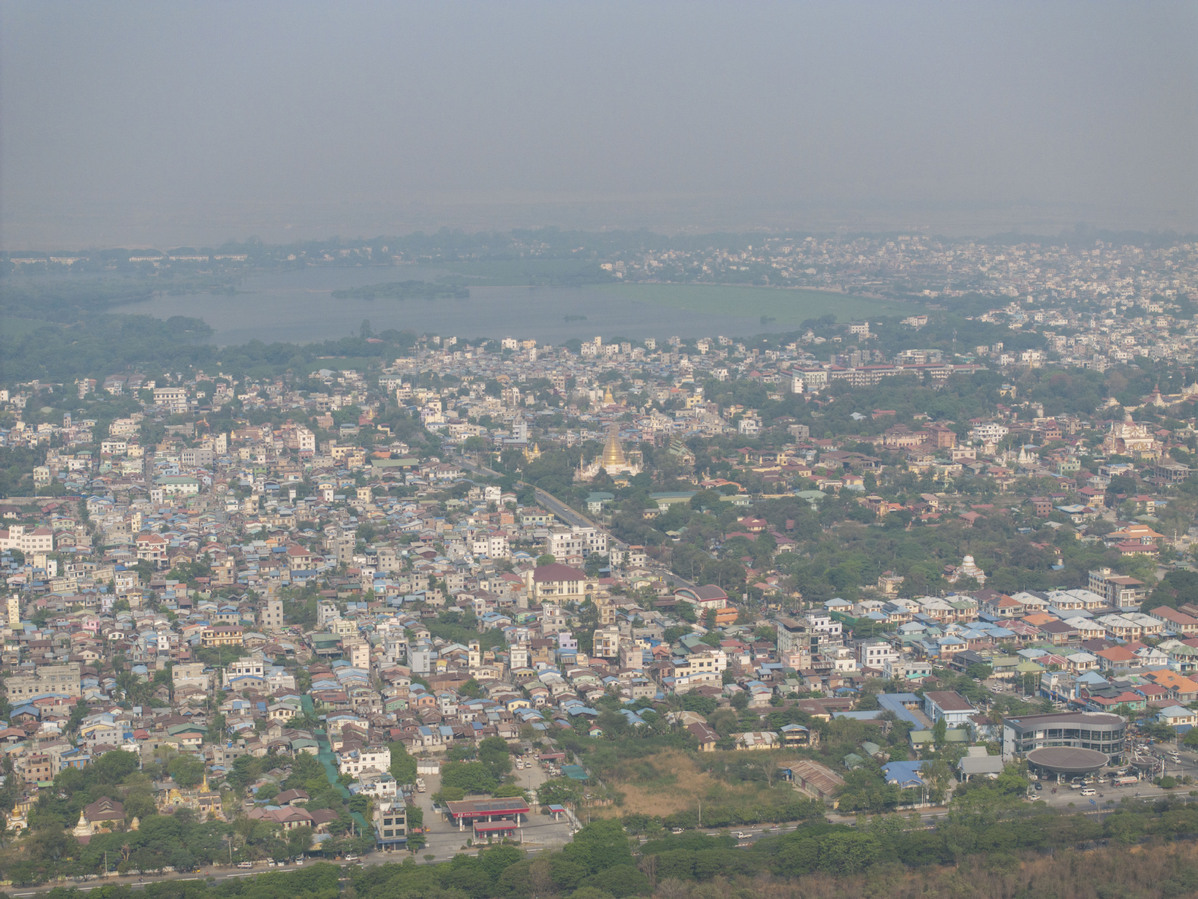
YANGON -- The Office of the Commander-in-Chief of Defense Services of Myanmar said on Wednesday that a temporary ceasefire will be in effect from April 2 to 22.
Out of compassion and understanding for the earthquake victims across the country, and in order to accelerate rescue and reconstruction efforts, as well as maintain peace and stability, a temporary ceasefire will be in effect from April 2 to 22, the office said in a statement.
The statement noted that the massive earthquake on March 28 and the subsequent aftershocks caused damage to roads, bridges, and buildings, resulting in casualties.
The country is making every effort to continue rescue and reconstruction work, it said.
The statement said that during the temporary ceasefire, ethnic armed organizations and other armed groups must not obstruct or attack civilian transportation routes, harm lives or public property, assault security force camps engaged in safety and law enforcement duties, attack military bases, mobilize or reorganize forces that undermine peace, or carry out any territorial expansion. If such actions are taken, the defense forces will take necessary measures to protect the people.
YANGON -- The China international search and rescue team has continued its rescue efforts in several areas of Mandalay, central Myanmar.
On Tuesday, eight operational groups conducted comprehensive inspections and reconnaissance at five key locations, covering a total of 30 buildings, with disinfection of an area of around 2,000 square meters.
Around Mandalay Buddhist University, in response to local residents' requests, a continuous nine-hour comprehensive search and demolition operation was carried out Tuesday in the nearby residential area, where the body of one victim was found and recovered.
At the Golden City Crown Hotel, an eight-story building was severely damaged, with the bottom four floors collapsing. The rescue team began operations at 3:50 p.m. local time on March 31, and has been working continuously for many hours.
Meanwhile, the rescue team deployed four medical groups Tuesday to provide on-site support for search and rescue operations, adjusted and set up epidemic prevention and disinfection points, established epidemic prevention and control guidelines for the Chinese rescue team camp, and carried out disinfection of 75,000 square meters in the camp and around 1,200 square meters at the rescue sites. Additionally, medical consultations were held.
YANGON -- The deadly earthquake in Myanmar has resulted in 3,003 deaths, 4,515 injuries, and 351 people missing, the official media Myanmar Radio and Television reported late Wednesday.
At 6 am Wednesday, I awoke in a mosquito net alongside hundreds of earthquake victims near the moat of Mandalay Palace.
The Chinese rescue teams were already hard at work, with generators humming and vehicles bustling. Food and water had been quietly placed outside people's mosquito nets, likely brought by local volunteer organizations or individuals in the early hours of the morning.
Across the street, an elderly woman in her 80s has been trapped for over four days. The dedicated volunteers from the Blue Sky Rescue team have been tirelessly digging for two days and nights in hopes of finding her alive. Last night at midnight, I overheard them discussing their next steps for the excavation.
To my left, the elderly woman's son and his family are taking refuge. Upon learning that I was a journalist from China, they kindly brought pillows and blankets to my mosquito net — my temporary residence. As I pen these words, they have even brought us hot fried dough sticks.
This is the city center of Mandalay, near the ancient imperial city. These disaster-stricken individuals may face the loss of generational heritage, potentially leading to months of makeshift camps by the river.
Yet, as the morning sun rises, I see children playing, residents washing clothes in the river and hanging them on the roadside railings, and many disaster victims still asleep.
Since my arrival in Yangon on Monday evening, nearly 48 hours have passed. I feel ashamed that my videos, photos, and words cannot fully capture all that I have witnessed. It is my hope that this personal perspective can offer you a more first-hand understanding of the situation in Myanmar's disaster-stricken areas.
As a Chinese saying goes, "In times of difficulty, support comes from all directions". On this journey, I have personally experienced the unwavering unity of the Chinese people. The Blue Sky Rescue team from Myanmar and the local chamber of commerce had already arranged vehicles for us and other volunteers arriving before and after us. The local telecom company provided us with complimentary SIM cards, and customs officials greeted us with respect and gratitude.
The rescue volunteers didn't even eat the boxed meals prepared for them. They got on the bus straight away and traveled overnight for over 12 hours, arriving in Mandalay on Tuesday afternoon. As of last night, more than 110 professional international rescue volunteers from the Blue Sky Rescue team had arrived in Myanmar, with hundreds more from other civilian rescue teams.
Myanmar's scorching temperatures, exceeding 40 degrees Celsius in Mandalay these days, present challenges for the rescue efforts.
These days are also a critical period for rescue, with opportunities to find signs of life. At this moment, the elderly woman across the street, still trapped, weighs heavily on the hearts of many rescue team members. Their tireless efforts, working for hours on end without rest, also resonate with the local residents.
After the earthquake, fear gripped the people, prompting them to camp in open spaces overnight rather than remain in their homes. Fortunately, Myanmar's nighttime temperatures are moderate, and the self-sufficient and resilient attitude of the locals has brought a sense of calm to the city post-disaster.
The four-year-old son of a local resident has been sleeping with a small backpack and shoes these nights — he said he is afraid and ready to escape with his most beloved belongings at any time.
Local people have been helping and expressing gratitude to the Chinese rescue team are happening every minute, allowing me to see the significant impact that the Chinese people are making in the world, as is reflected by the attitude of the local people.
Anyone wearing Blue Sky Rescue team blue uniform driving to refuel doesn't need to wait in line, and even gas stations refuse payment. When Chinese rescue personnel go shopping or eat, locals warmly express their gratitude. Traffic police clear the way for vehicles from the Chinese rescue teams. When rescue workers need construction machinery such as excavators, relevant companies and organizations send assistance to the best of their ability.
However, the Blue Sky Rescue team strictly adheres to discipline and does not accept any gifts, insisting on paying for all expenses.
A volunteer from Blue Sky Rescue, who prefers to be called "Dry Cloud", told me that rescue work requires a lot of specialized knowledge depending on the actual situation at each site. For example, if some houses are very fragile and collapse completely during the earthquake, the excavation is simple — the injured can be rescued quickly. But for buildings that have not collapsed and are leaning, extra caution is needed during rescue. Designing excavation plans to avoid secondary collapse and harm to rescue personnel is crucial.
He also reminds all arriving volunteers that while helping others, they must have professional knowledge and technical support and pay attention to their own safety.
Continuous influxes of relief materials and donations from various parts of China have been arriving. Post-disaster recovery efforts, including body cleanup, epidemic prevention, medical care, road repairs, water supply and power restoration will also begin one after another.
Stay tuned to China Daily as we will continue to bring you firsthand reports from the front lines.
Xu Nuo in Beijing contributed to this story.
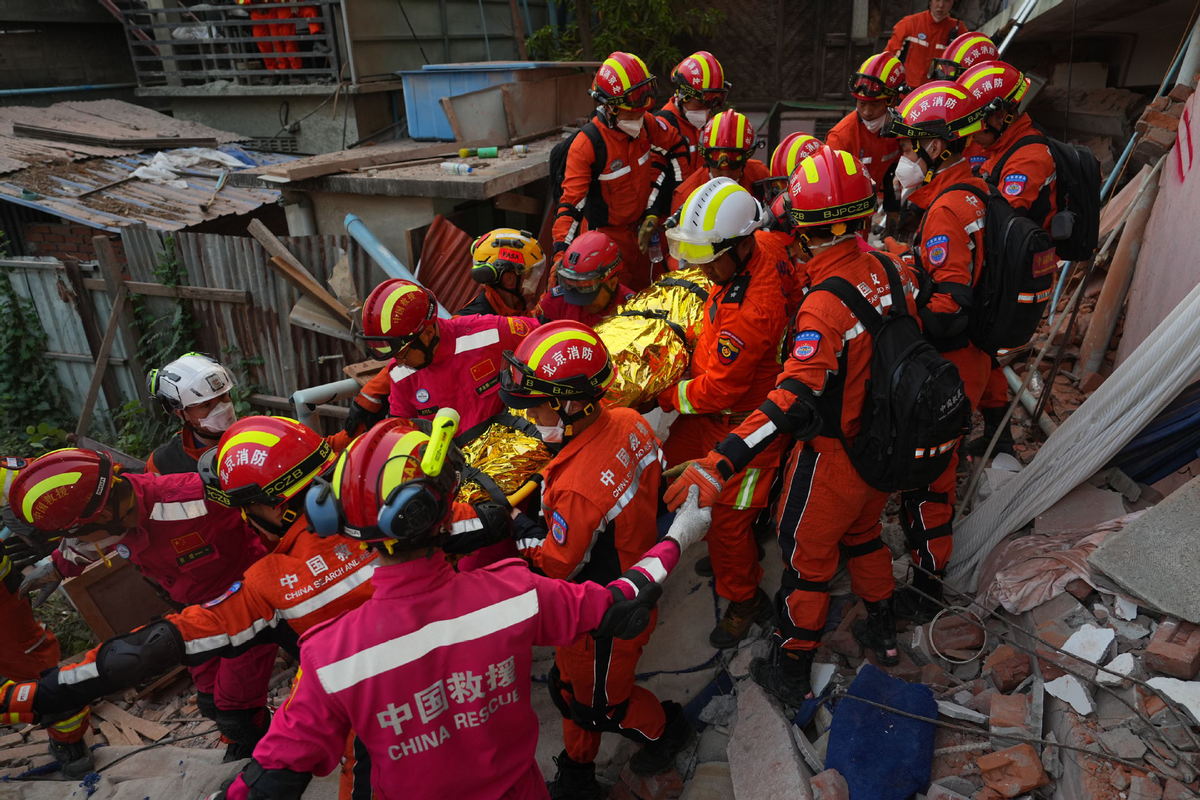
YANGON -- The Chinese rescue team successfully extricated a male survivor at a hotel on Wednesday afternoon in Mandalay, Myanmar.
The man, an employee of the E-outfitting Golden Country Hotel, had been trapped for over 120 hours and was in stable condition when rescued.
The survivor has been transferred to a local hospital for further treatment. This marks the ninth survivor successfully rescued by the Chinese rescue teams.
YANGON -- A man trapped beneath the debris of a collapsed guesthouse for 122 hours was rescued in Myanmar's Sagaing region, following Friday's devastating earthquake, according to the Myanmar Fire Services Department (MFSD) on Wednesday.
The MFSD rescue team, in collaboration with international rescuers, carried out the operation and successfully pulled him out alive at 2:45 pm local time on Wednesday, it said.
Rescue efforts are still ongoing, according to the department.
To ensure rescue forces and materials from China's Yunnan province swiftly reach the quake-hit areas in Myanmar, the Kunming Customs fast-tracked customs clearance of relief goods, rescue team members, and search and rescue dogs.
